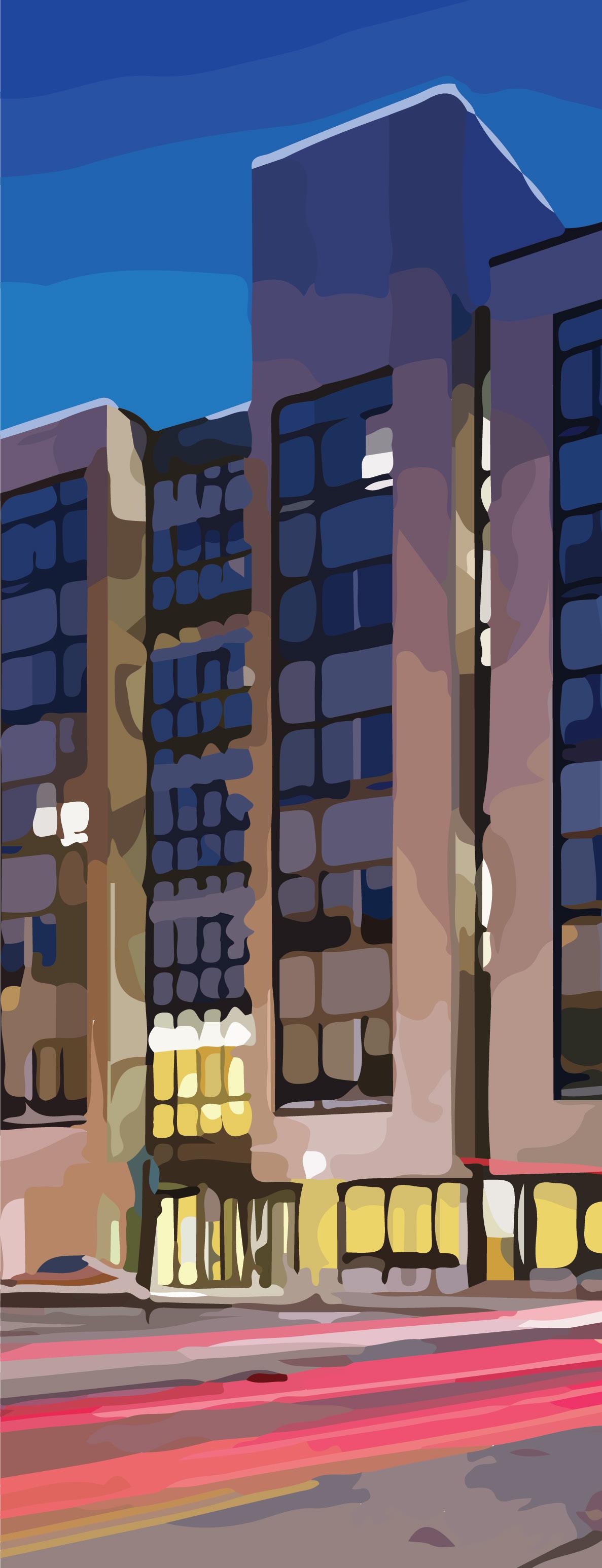






















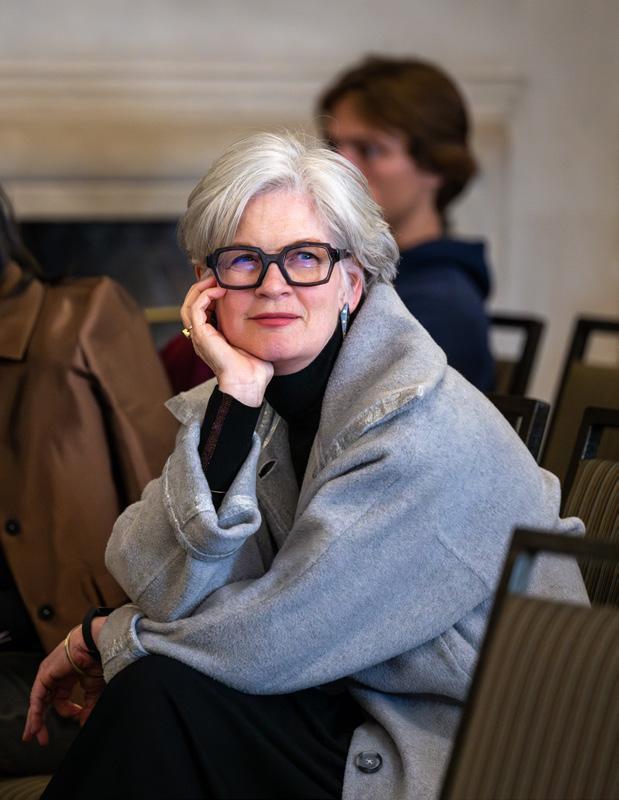
dear friends of the Institute,
This is my last annual report letter as director of the Institute for the Humanities! My term will end this summer and I am thrilled that Jason Young, professor of history, will be our next director. I’m excited to see where Jason will take the institute and I’m confident that the humanities have a vibrant future at U-M and in southeast Michigan under his leadership.
I write my last missive to you in a time of intense turmoil at universities across the U.S. Our own campus is alive with daily protests and counterprotests. It’s hard to imagine what the world’s physical and geopolitical landscape will look like by the time this report arrives in your mailboxes, but it seems inevitable that it will be changed. Higher education will certainly be reshaped by current events since cornerstones of our collective project—faculty governance and academic freedom—are under siege.
As you know, the humanities are ever more important in a world on fire. Analyses of rhetoric and claims to truth, of histories of encounter and conflict, and of philosophies of justice and injustice are urgent, as are understandings of human suffering and resilience expressed through testimony, memoir, song, story, poetry, paintings, graffiti, and protest posters. The methods and insights of the humanities structure contest and disagreement as well as dialogue and exchange.
This year, as in past years, the institute has been a site for deliberate and wide-ranging exploration, through academic programs, gallery exhibitions, our interns’ activities, and the brilliant work of our fellows. Please read all about it in the pages that follow.
Very best wishes,
Peggy McCracken, director Mary Fair Croushore Professor of the Humanities
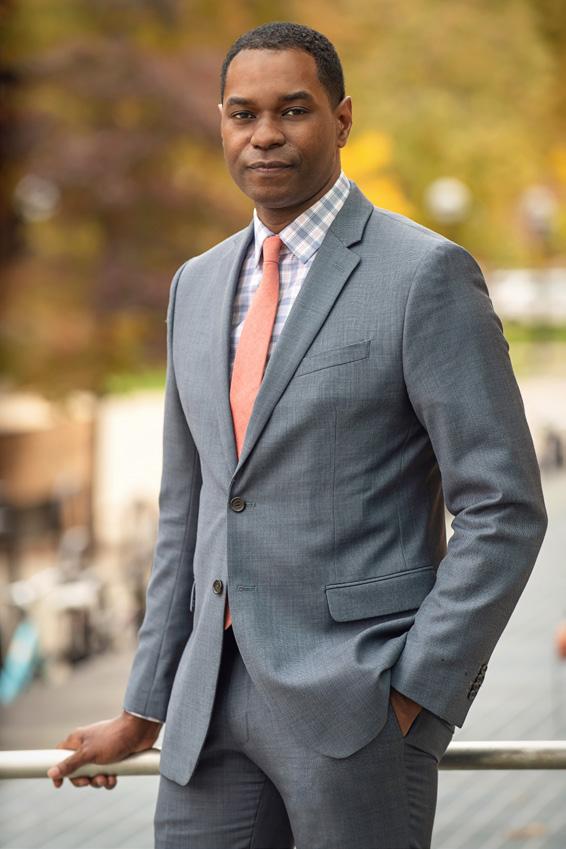
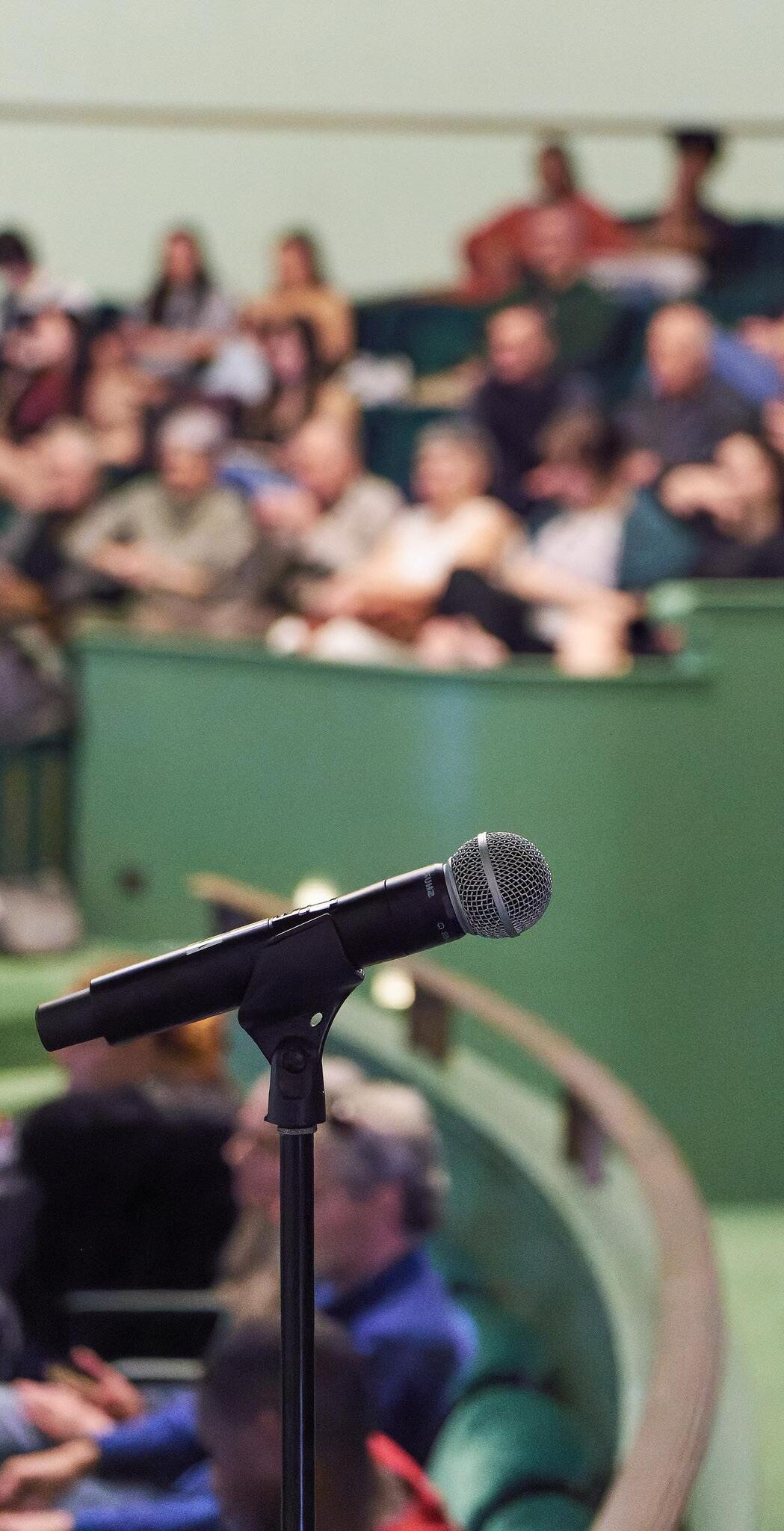
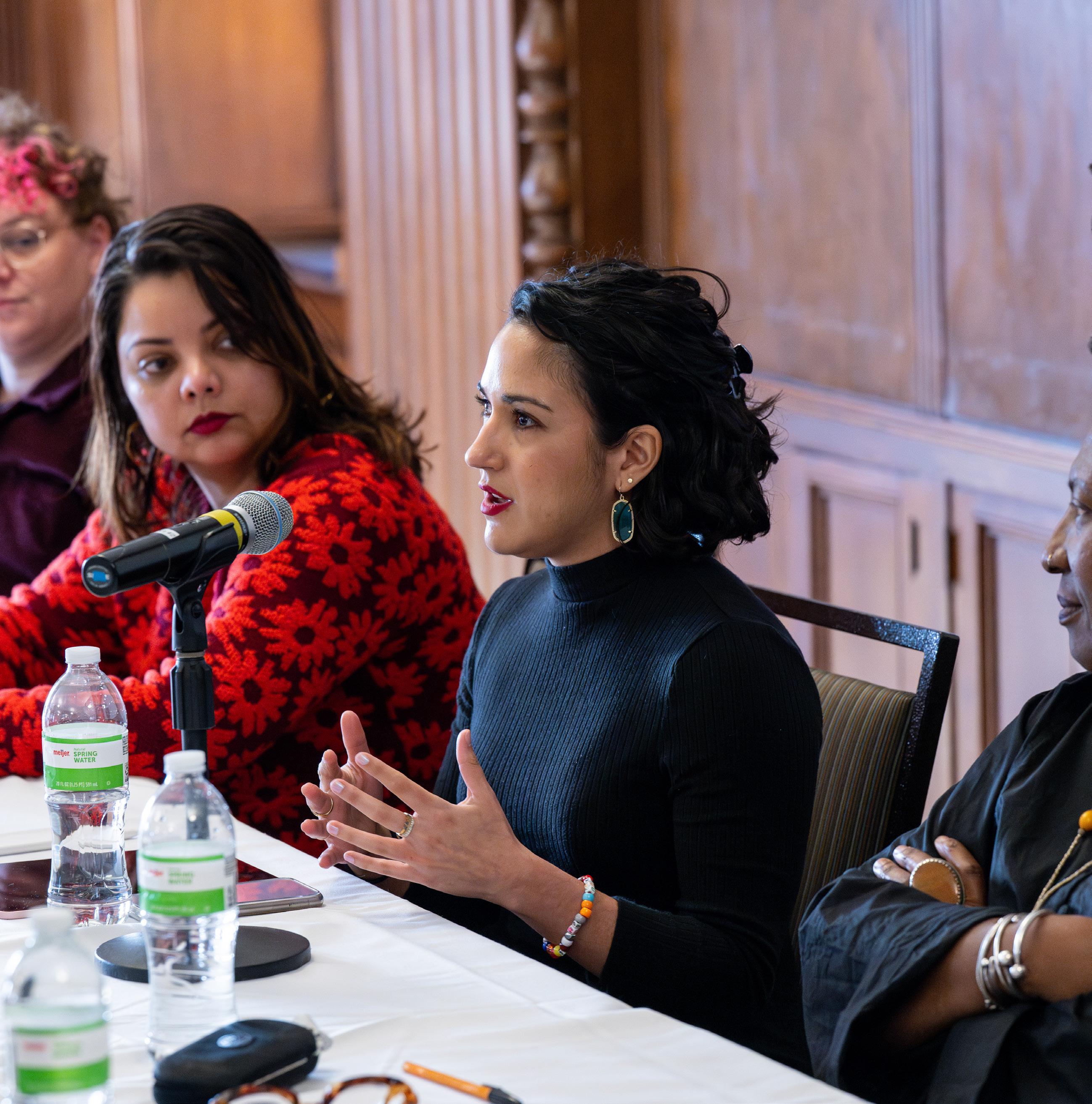
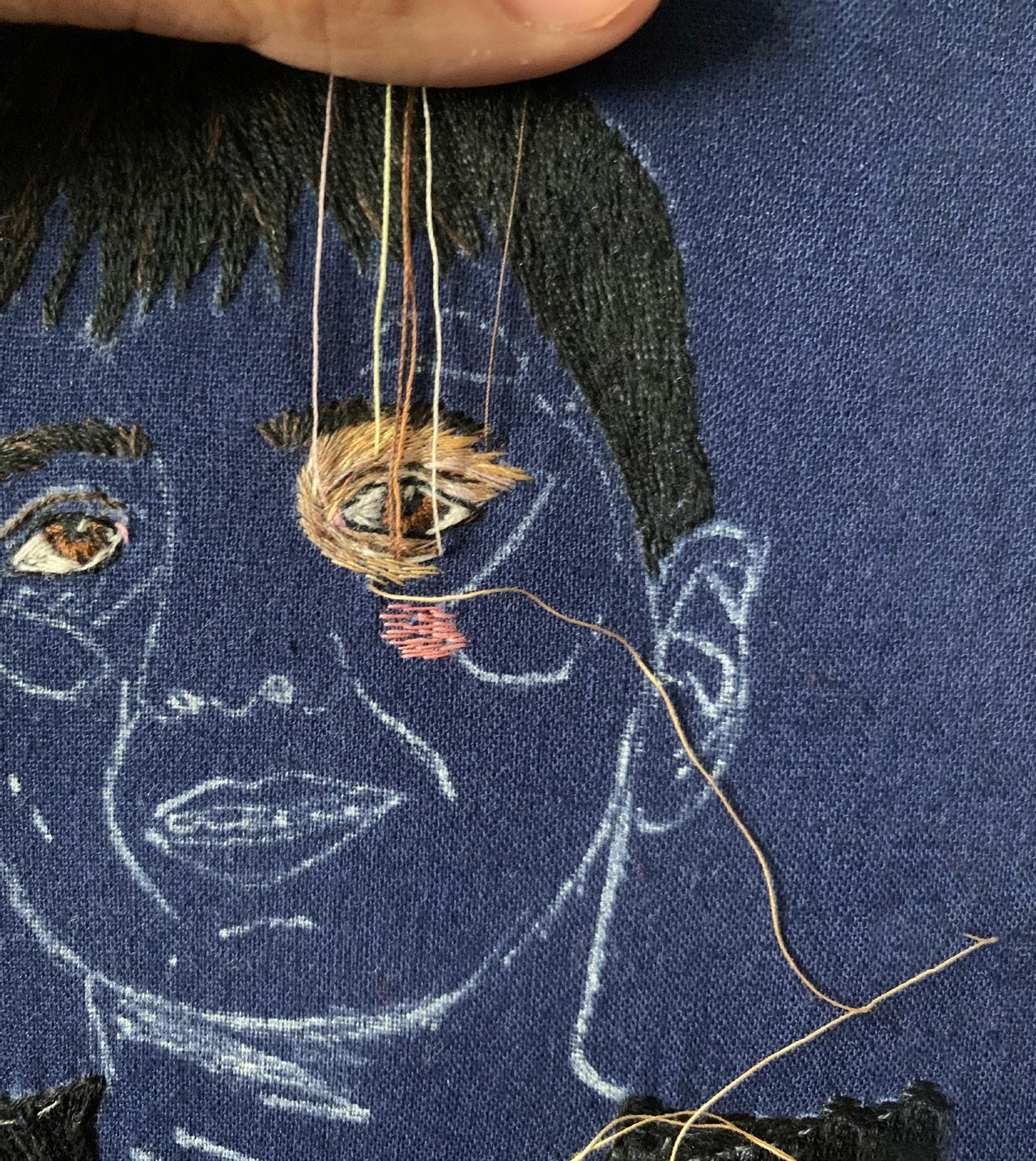
(Re)Emergence: Asian American Histories and Futures, a collaboration between Asian American studies scholars and the Institute for the Humanities, was a series of events committed to interdisciplinary exploration and community engagement. The series brought together filmmakers, creative writers, scholars, and activists to think through diverse Asian American histories and how we might learn from them to shape radically different futures.
MAJOR FEELINGS: CATHY PARK HONG IN CONVERSATION WITH PETER HO DAVIES
Marc and Constance Jacobson Lecture
Cathy Park Hong is an award-winning poet and essayist whose book Minor Feelings: An Asian American Reckoning ruthlessly reckons with the American racial consciousness. Hong weaves together personal stories, historical context, and cultural criticism to ultimately create an emotional and impactful exploration of Asian American personhood. Cathy Park Hong was in conversation with Peter Ho Davies, U-M Professor of English Language and Literature, discussing her life and work.
This panel featured a U-M faculty discussion of decolonial ethnic studies as it relates to Asian American histories and futures.
Panelists:
• Frieda Ekotto, Lorna Goodison Collegiate Professor of Afroamerican and African Studies, Comparative Literature, and Francophone Studies
• Aliyah Khan, Director of the Global Islamic Studies Center, International
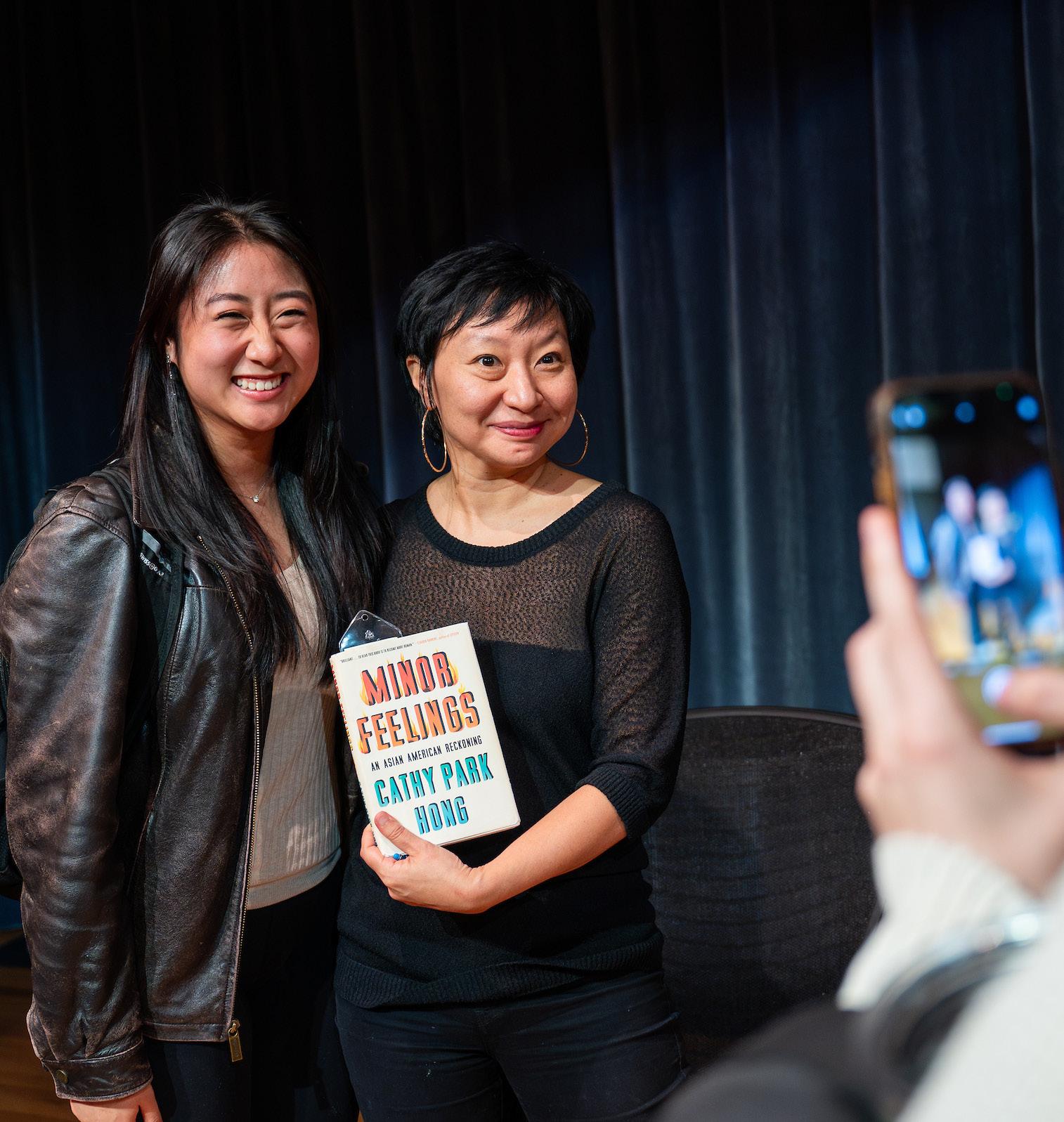
Institute; Associate Professor English and African and African American Studies
• Umayyah Cable, Filmmaker; Assistant Professor, American Culture and Film, Television, and Media, and a core faculty member in the Arab and Muslim American Studies
• Sara Awartani, Assistant Professor, American Culture, with affiliation in the Program in Latina/o Studies and the Program in Arab and Muslim American Studies
Moderator: Victor Mendoza, Associate Professor of American Culture, Women's and Gender Studies, and English Language and Literature
In their thought-provoking film In Search of Bengali Harlem, Vivek Bald and Alaudin Ullah delve into the rich tapestry of Bengali Muslim immigrants who made their home in mid-20th century Harlem, intertwining their lives with Black American families. Their narrative challenges the conventional portrayal of immigrants and immigration processes, offering a nuanced perspective on New York and American history. Against the backdrop of a post-9/11 world, the film becomes a powerful testament to the resilience of communities resisting stereotyping and transcending the borders we impose upon ourselves.
The film screening was followed by a
conversation with director Alaudin Ullah and Professor Manan Desai, Associate Professor of American Culture and English Language and Literature.
The past few years have witnessed energetic and innovative forms of activism among Asian Americans contending against rising anti-Asian racism and violence. What does contemporary Asian American activism look like, especially in the context of movements for racial justice, the COVID-19 pandemic,
heightened U.S.-China tensions, and wars in the Middle East and beyond? In this panel, Asian American leaders working for change on several issues—gun violence, reproductive justice, ethnic studies education, reproductive justice, voting rights, and more—discussed the principles and practices of contemporary Asian American activism.
Panelists:
• Andrea Chu, Asian Americans Advancing Justice - Chicago
• Regina Tsang, Rising Voices - Michigan
• Dr. Tsu-Yin Wu, Center for Health Disparities Innovation and StudiesEastern Michigan University
Moderator: Melissa Borja, Assistant Professor of American Culture

Pathways
Photographer, photojournalist, and activist Devin Allen spent five days at the institute in the fall as part of our expanding public engagement programming. Allen’s work first gained attention in early 2015 when his images of the Baltimore Uprising went viral on Instagram. In May, one of those images was featured on the cover of Time, making him only the third amateur photographer to be featured in the publication.
Allen's success has taken him across continents, onto television screens, book covers, and into the hearts of young people. During his time with the institute, his community engagements inspired and nurtured inner creativity through genuine conversations and long-lasting relationships.
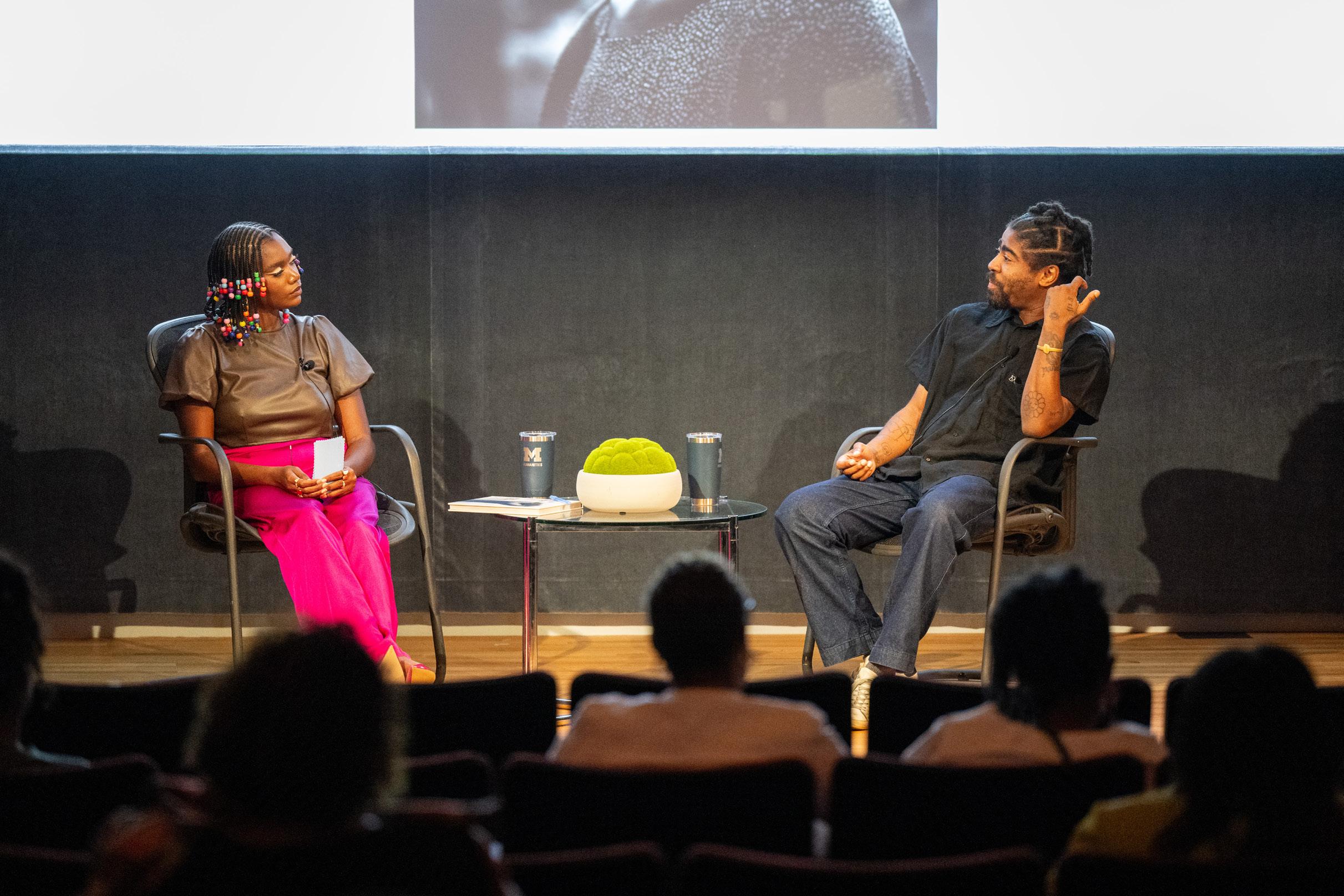
For this event, Devin Allen was in conversation with Detroit writer and long-form storyteller Imani Mixon, exploring the inspiration, joys, and challenges of Allen's photography, as well as the diverse communities of Baltimore. The evening ended with a Q&A session, where students and residents from Oakland and Wayne counties asked questions ranging from technical to exploratory.
Allen's passion for encouraging youth to express themselves through photography was evident during his photo walk with Ann Arbor high school students at the Pathways to Success academic campus. He spent a day with students sharing stories from his teenage years and discussing how access to art and support from his family positively impacted his life. The afternoon was spent critiquing photos taken by the students as they walked through the halls of the school.

The Public Humanities Interns ran a photo contest on Instagram called “Humans in Action,” where students were encouraged to submit photos that capture authentic moments in time to win a signed copy of Allen's award-winning book No Justice, No Peace: From the Civil Rights Movement to Black Lives Matter. The top three winners were selected by the interns using a metric scoring system and all participants were invited to an intimate dinner with Allen in the Osterman Common Room.
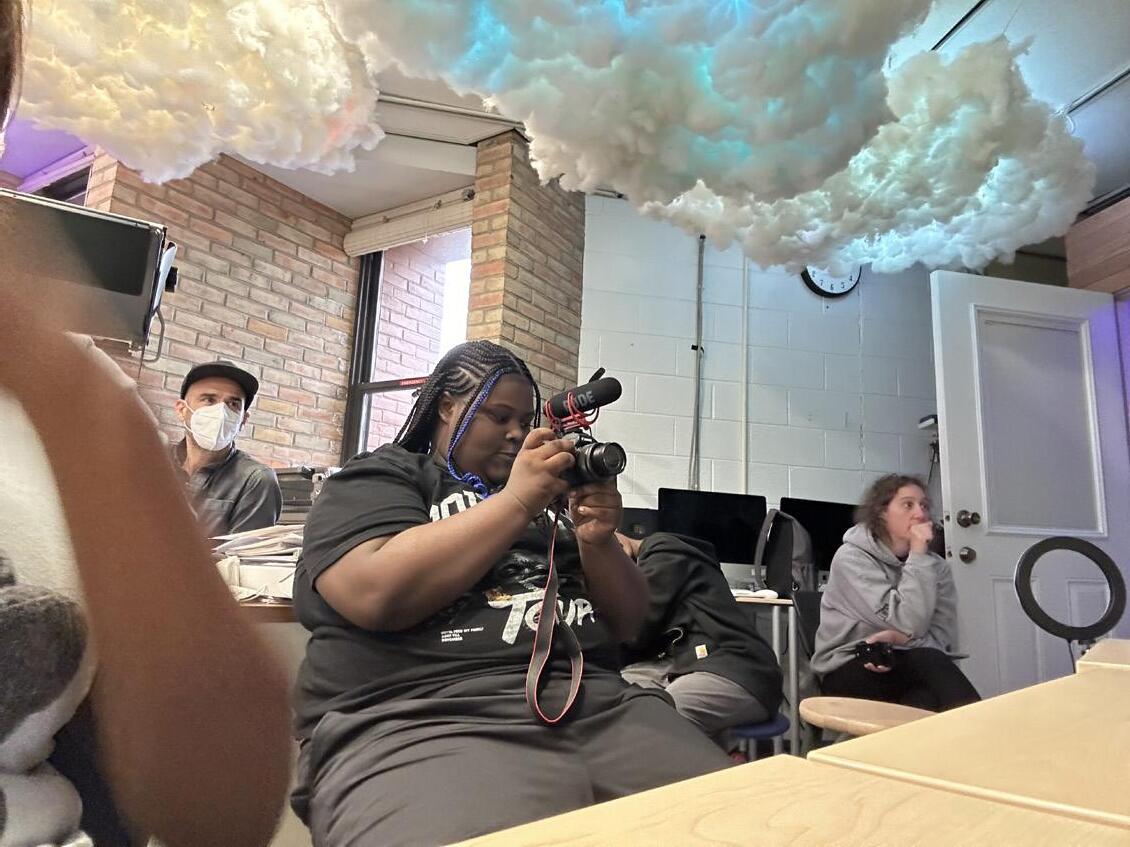
2023 Jean Yokes Woodhead Visiting FelloW
Using the media of the arts, the panelists discussed the visual and performative language of activism to think about the role of gender and the visual arts in revolutionary Iran.
Panelists:
In the fall of 2023, we joined forces with the Department of Middle East Studies to bring New York-based artist Orkideh Torabi to U-M as part of the campuswide Arts & Resistance theme semester. During her residency, Torabi participated in a panel discussion on women and revolutionary art in Iran, met with students, and gave a Special Penny Stamps Lecture to a packed audience.
Torabi also lectured at U-M Dearborn, marking our inaugural event there and providing an opportunity to connect with southeast Michigan’s Persian community through the Persia House of Michigan.

Here in our Osterman Common Room, we installed a wall-size vinyl print of one of Torabi’s paintings, providing a colorful and dynamic backdrop for numerous events and meetings held there throughout the academic year.
Torabi was born in Tehran and earned an MFA from the School of the Art Institute of Chicago and an MA and BFA from Tehran University of Art. Drawing inspiration from her Iranian heritage, Torabi explores themes of cultural identity,
diaspora, and the tethering between past and present. Her painting process blends elements of Persian miniature painting with contemporary subject matter. Torabi draws from her deep understanding of Persian visual traditions, while at the same time pushing the boundaries of those traditions in both method and meaning.
• Orkideh Torabi
• Nahid Siamdoust, Assistant Professor of Middle East Studies, University of Texas
• Niloofar Sarlati, Assistant Professor of Comparative Literature and English Language and Literature, U-M
Moderator: Kathryn Babayan, Professor in Middle East Studies and History, U-M
Special Penny Stamps Lecture
Torabi discussed how her paintings challenge traditional concepts of femininity, power, and identity by merging Persian miniature art with contemporary imagery. She explored the role of storytelling in her work, introducing the array of characters she has created, and discussing how her Iranian heritage influences her exploration of themes like cultural identity, diaspora, and the interplay between tradition and modernity.
In this talk at U-M Dearborn, Torabi discussed the transition of her focus from gendersegregated spaces to power dynamics and governance while taking a broader perspective on society.
Orkideh Torabi was the 2023 Jean Yokes Woodhead Visting Fellow at the Institute for the Humanities. Special thanks to the Department of Middle East Studies and the Institute for Research on Women and Gender for their support.
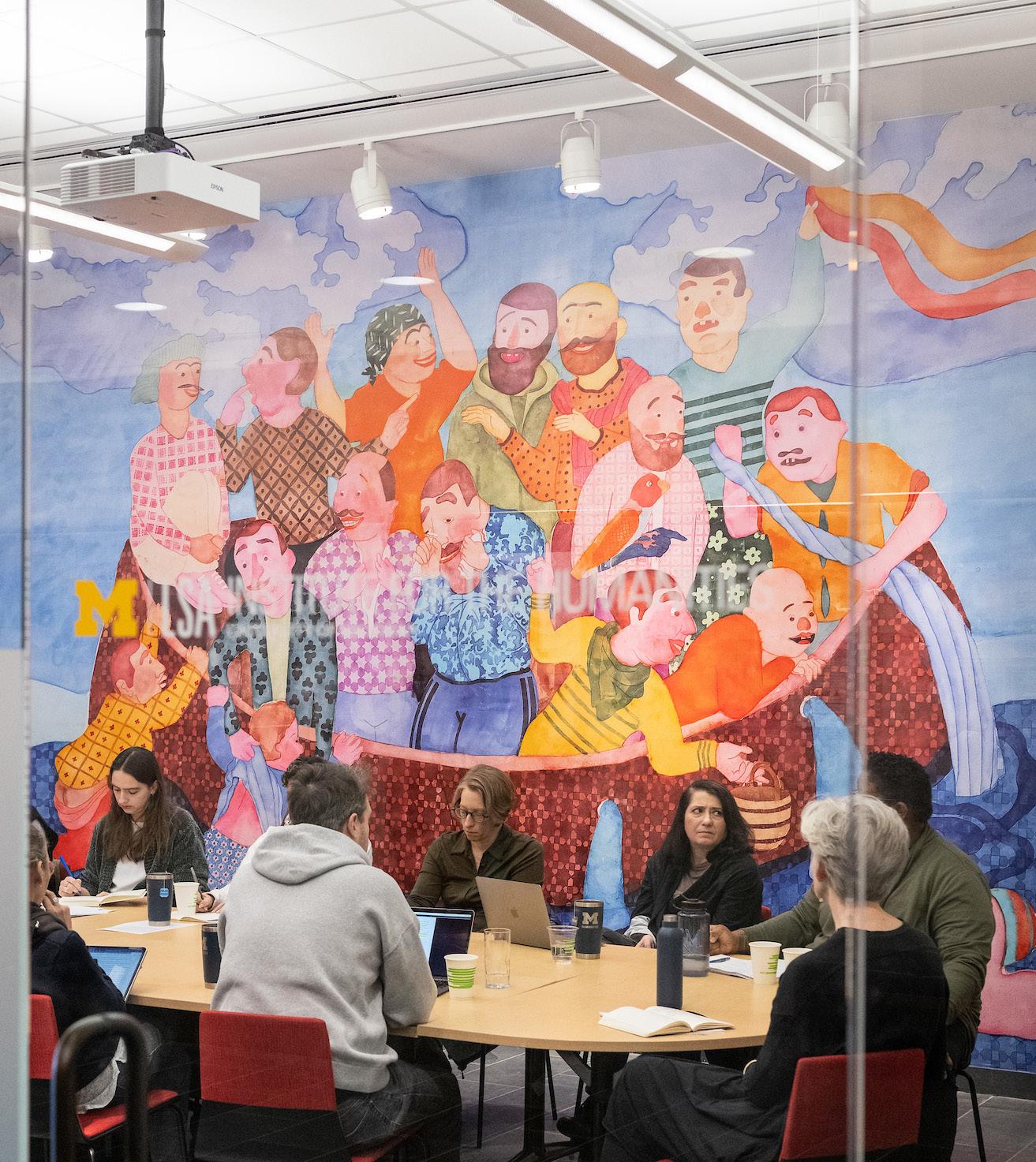
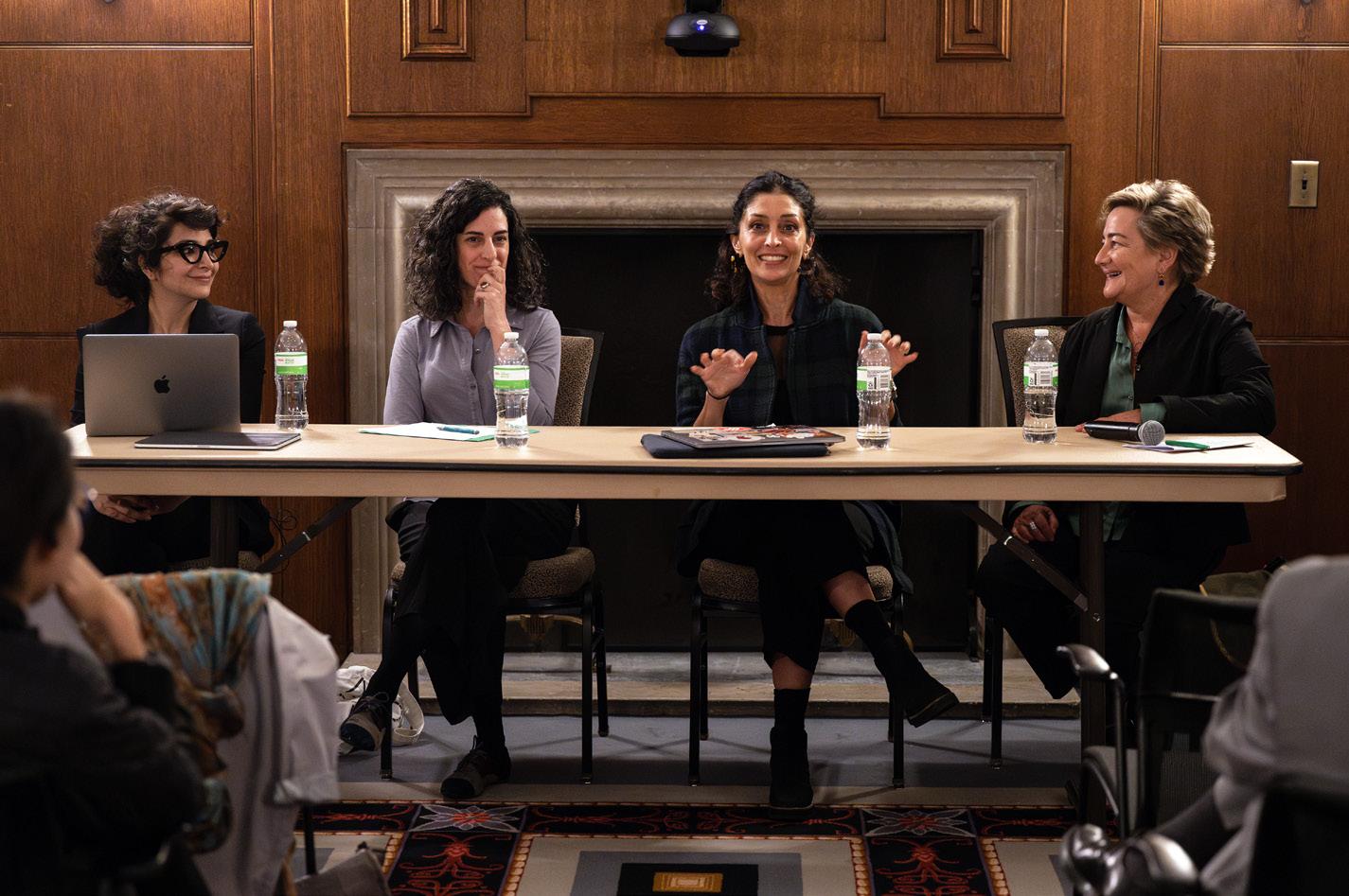
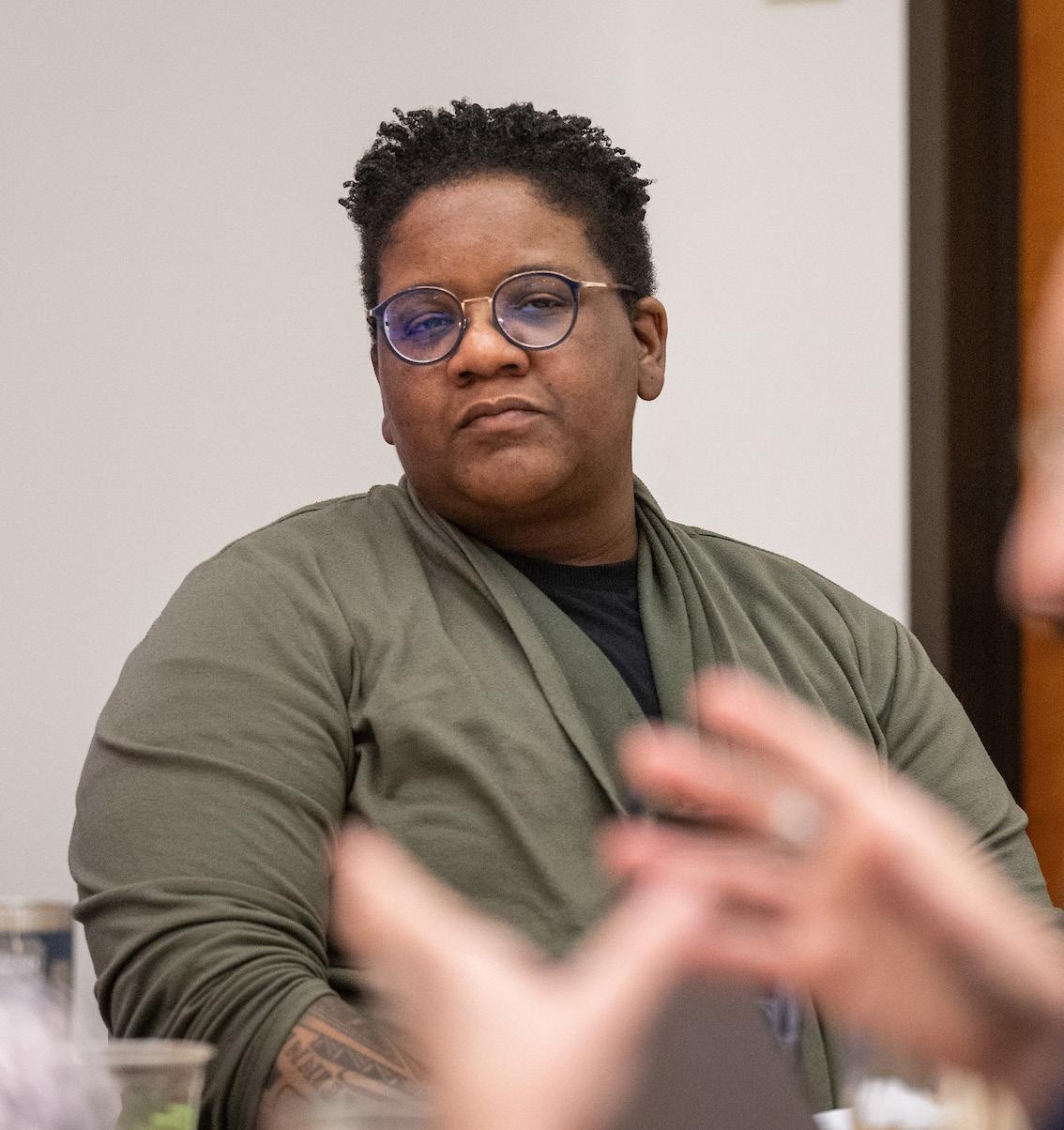
2023-24 Hunting Family Faculty Fellow
The generous and interdisciplinary community at the institute provided a soft landing place for risky ideas, helping to push my research in fascinating ways. It was a space where the privilege to deeply engage with others’ works in progress was an honored invitation and not a strenuous obligation. This meant I felt empowered and challenged by the broad representation of topics, theories, and methods and enjoyed when we were able to see common ground in each others’ work.
The fellowship also allowed me the opportunity to practice collegiality by learning about my own style of collaboration, different approaches to feedback, and importantly, to build points of connection across generations of scholars. As a junior scholar, it was instructive to see everyone practice vulnerability as the fellowship community created a reassuring environment where we highlighted instead of glossed over the growing pains of works in progress. The visiting scholar program was also a welcomed aspect of the fellowship, allowing us a glimpse into how the humanities are engaged in other contexts.
While in the fellowship I was able to complete a draft of my manuscript including a new chapter. Additionally, I was inspired to seek out senior scholar collaborators to explore projects related to and beyond the manuscript. Fellowship time was crucial to cultivating relationships with potential external letter writers and collaborators.
It was a privilege to embrace the goals of the fellowship, each session was an opportunity to fall back in love with well-worn work and sparked enough inspiration for many works to come.
Jessica Walker is Assistant Professor, Afroamerican & African Studies and American Culture
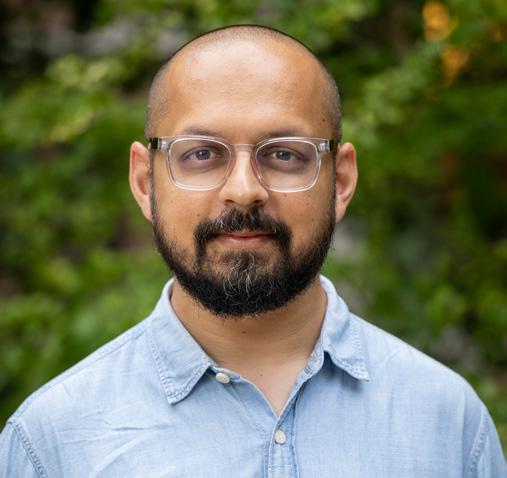
HELMUT F. STERN FACULTY FELLOW AMERICAN CULTURE AND ENGLISH LANGUAGE AND LITERATURE “Pandit Plays America: Race, Exotica, and the Cold War"
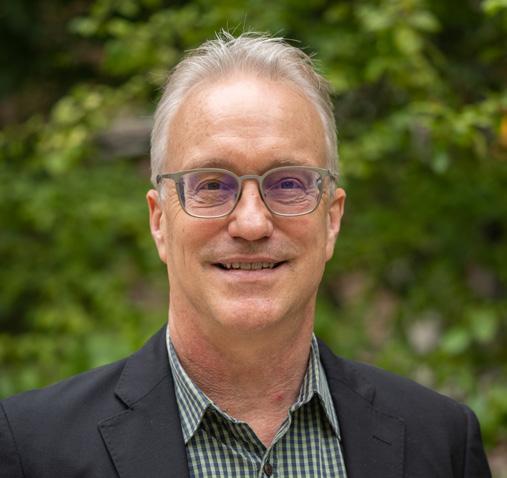
ERIK MUEGGLER
RICHARD AND LILLIAN IVES FACULTY FELLOW; ANTHROPOLOGY, “The Book of Cunning and Treachery: Writing, Sovereignty and Bondage in a Qing Native Domain”
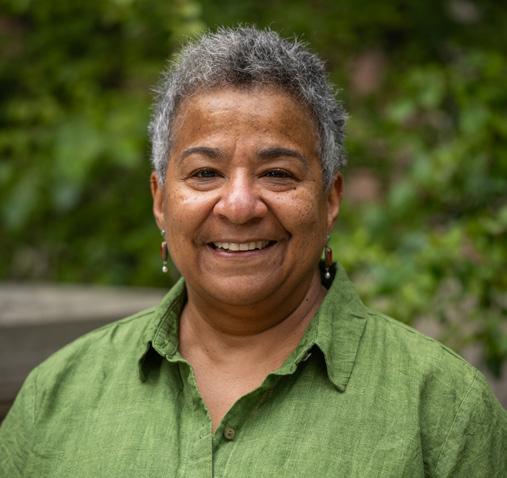
HELMUT F. STERN FACULTY FELLOW ENGLISH LANGUAGE AND LITERATURE, AMERICAN CULTURE, WOMEN'S AND GENDER STUDIES, AFROAMERICAN AND AFRICAN STUDIES, “Expanding the Black Civil War: Gender, Sexuality, Community"

SCOTT POULSONBRYANT
STEELCASE FACULTY FELLOW AFROAMERICAN AND AFRICAN STUDIES,“ When You Were Mine: The Queerness of Prince”
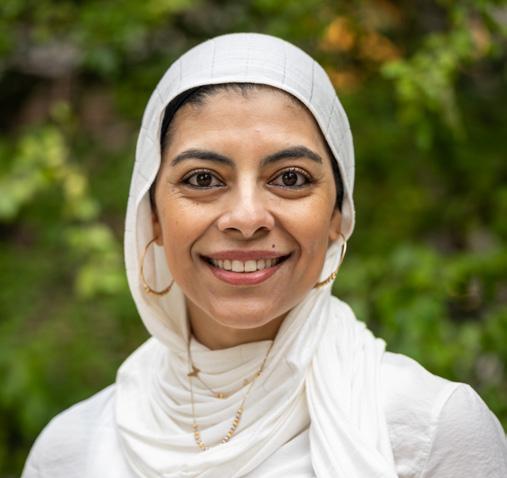
NANCY KHALIL
CHARLES P. BRAUER FACULTY FELLOW; AMERICAN CULTURE
“Imams of Us: Decentralized Religion, Religious Freedom, and the Establishment of US Islam”
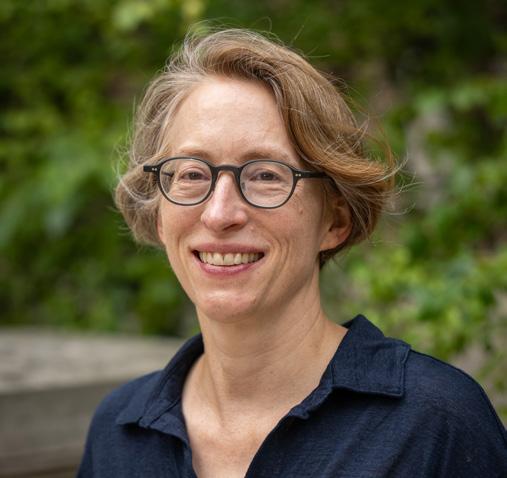
GRETA KRIPPNER
JOHN RICH FACULTY FELLOW SOCIOLOGY,“Preferred: Race, Gender, AIDS and the Individualization of Risk”
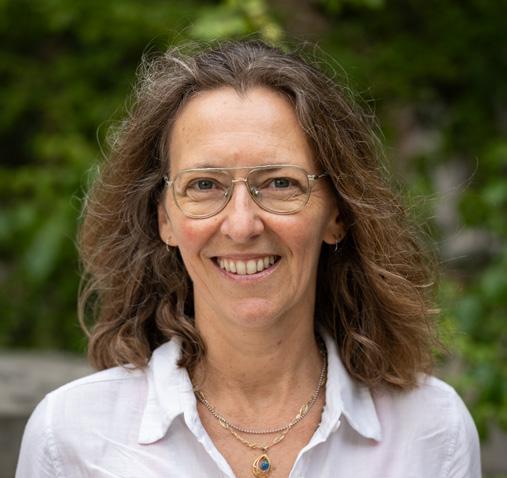
MIREILLE RODDIER
HUNTING FAMILY FACULTY FELLOW ARCHITECTURE, WOMEN'S AND GENDER STUDIES, “Radical Vernacular"

JESSICA WALKER
HUNTING FAMILY FACULTY FELLOW AFROAMERICAN AND AFRICAN STUDIES, AMERICAN CULTURE “Her Kitchen is the World: Black Women and the Culture of Soul Food”
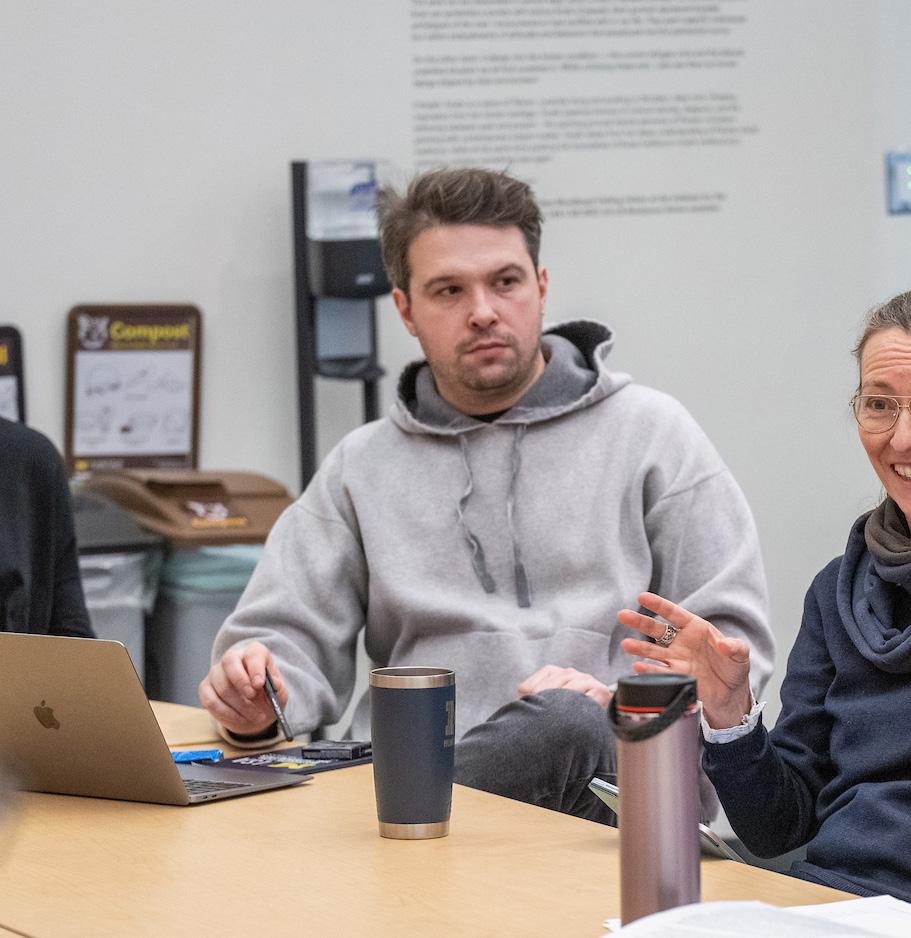
2023-24 Mary Fair Croushore Graduate Fellow
A fellowship at the Institute for the Humanities offered me the time and space to develop my work in community with scholars whose research, interests, and visions of the world differ vastly from my own.
The most intellectually formative component of the fellowship is undoubtedly the seminar, a weekly gathering where fellows workshop works in progress. Participating in the seminar offered an escape from the insularity of dissertation writing. It exposed me to fields, from food studies to performance studies, and objects, from classical poetry to exotica music, that are so different from my interests in the social and environmental costs of digital technologies and the internet. The seminar taught me to be a better reader, critic, and collaborator. It helped me expand my understanding of what the humanities are and can do; it taught me to both respect and challenge disciplinary and theoretical boundaries; and it showed how to imagine my work addressing an audience of scholars, artists, and activists that is much larger than I typically imagine.
Over the year, I was able to write my dissertation and use feedback from my fellows to draft an article that I recently submitted to an interdisciplinary humanities journal. More importantly, I also felt that the fellowship reignited my interest in producing cultural criticism. I started having new ideas, imagining future research, and working on projects after a long period of feeling like my work was stagnant. I learned from fellows who pushed me to see from different disciplinary angles, who gave me the confidence to be more creative, and who helped me rediscover how much I enjoy supporting my colleagues. I attribute my renewed excitement entirely to the institute, its director, its staff, and the community of fellows that their work brought together.
Cengiz Salman is a PhD student in American Culture
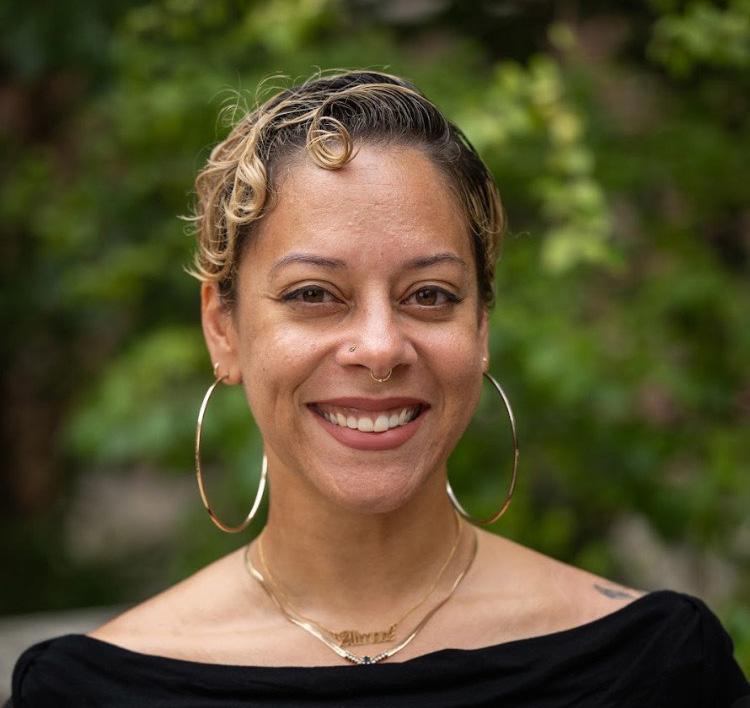
JAMES A. WINN GRADUATE FELLOW
ENGLISH AND EDUCATION, “Care in Containment: The Geography of Black and Indigenous Encounters within the Captivity of School"
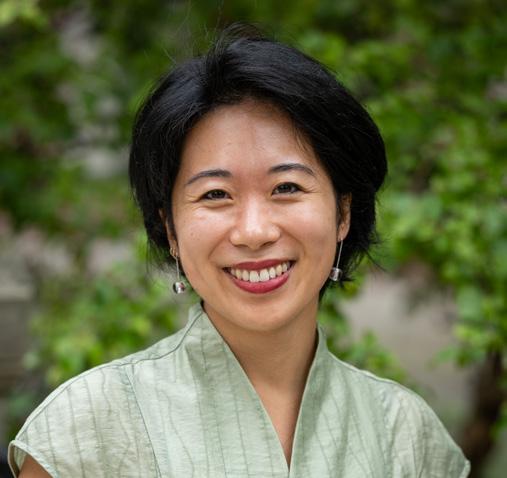
CARLINA DUAN
DAVID AND MARY HUNTING GRADUATE FELLOW; ENGLISH AND EDUCATION, “Towards a Disobedient Poetics: The Generative Practices of Eight Contemporary Documentary Poets of Color"
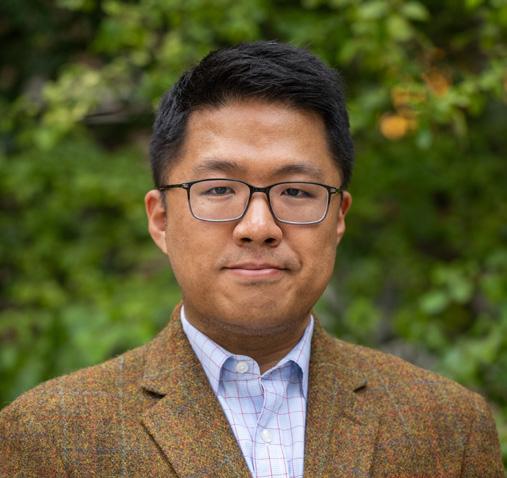
RICHARD & LILLIAN IVES GRADUATE FELLOW; ROMANCE LANGUAGES AND LITERATURE, “Urban Exergue: On Blackness, Spectrality, and the Poetics of Landscape in Contemporary Italy"
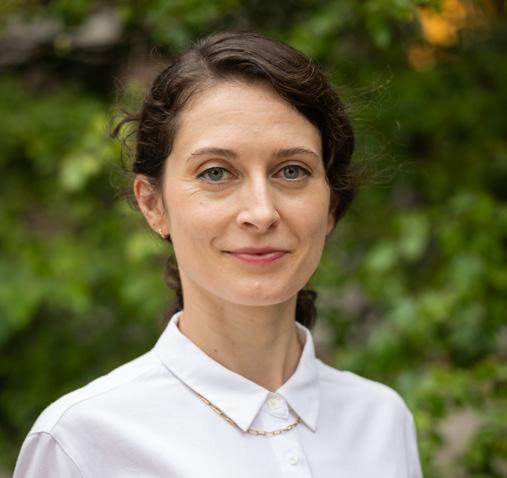
DAVID AND MARY HUNTING GRADUATE FELLOW; COMPARATIVE LITERATURE, “Radiopoetics: On Sound as Literacy, Critical and Pedagogical Practice"

PAU NAVA
MARY FAIR CROUSHORE GRADUATE FELLOW; AMERICAN CULTURE
“The Artist as Community Archivist: A Chicago Case Study”
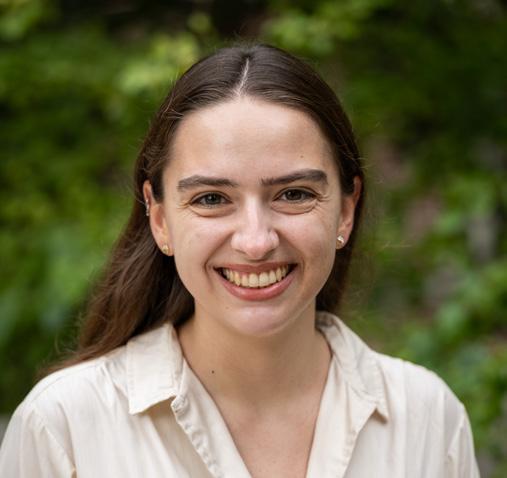
AMANDA KUBIC
SYLVIA 'DUFFY' ENGLE GRADUATE FELLOW; ROMANCE LANGUAGES AND LITERATURE, “Animating Antiquity: Classical (Dis)embodiments by Modern Women”
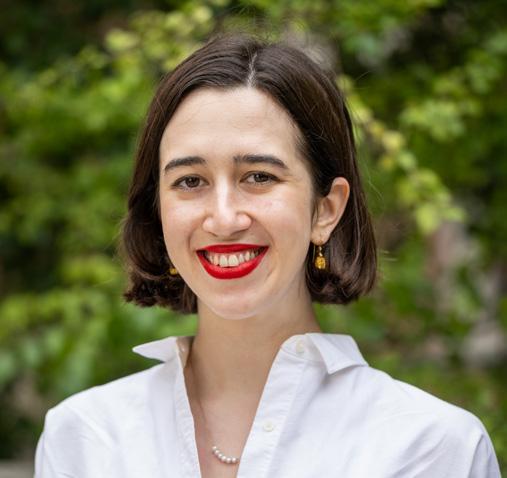
MERISA BAHAR SAHIN
MARC AND CONSTANCE
JACOBSON GRADUATE FELLOW; POLITICAL SCIENCE, “Anticolonial Cosmopolitanisms: Young Ottoman Anticolonial Thinkers and Projects of Global Integration, 1884-1914”
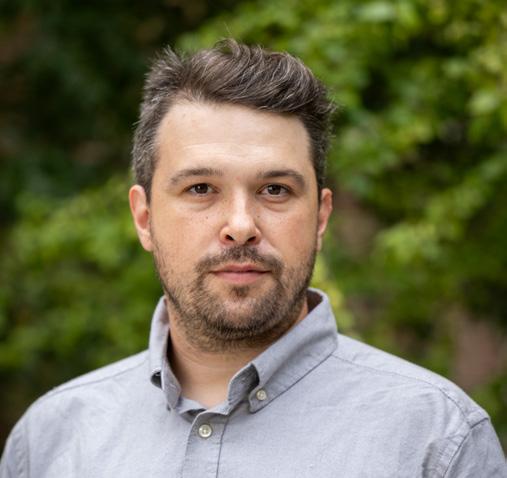
CENGIZ SALMAN
MARY FAIR CROUSHORE GRADUATE FELLOW; AMERICAN CULTURE
“The Universal Fix: Computation as Mistaken Remedy"
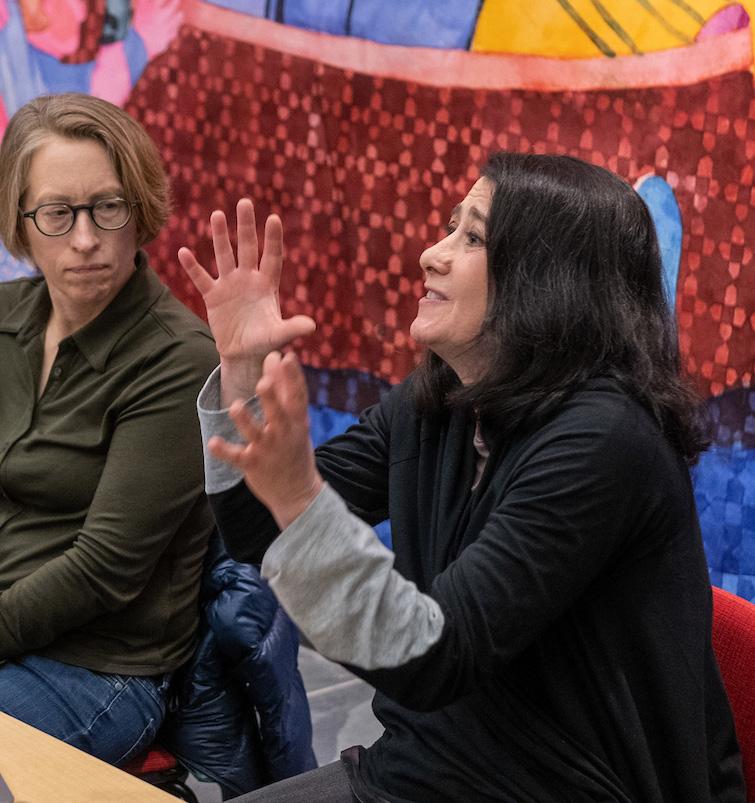
Norman Freehling Visiting Professor
a perfect group of scholars to work with
Jodi Melamed took up residence at the institute during winter term 2024 as the Norman Freehling Visiting Professor. Melamed is a professor of English and Race, Ethnic, and Indigenous Studies at Marquette University in Milwaukee, Wisconsin. Her research and teaching interests include racial capitalism; critical race, ethnic and indigenous studies; intersectional and abolitionist feminisms; and queer of color critique.
While at the institute, Melamed continued work on a book she is writing with Chandan Reddy titled Operationalizing Racial Capitalism: On Liberalism’s Command Power, a theory-driven book meant to be read by scholars throughout the humanities and related interdisciplinary fields. “The institute’s fellows—located in all the humanities disciplines and more—were a perfect group of scholars to think with,” she said, “Their range helped me understand how the arguments of the book speak (or do not yet speak) to fields as diverse as English and sociology.”
Melamed participated in the weekly fellows’ seminars and gave a public talk on “Nation-States as Racial Capitalist Operability and the Doings that Evade and Disable It.” She also graciously accepted an invitation from the public humanities interns to share her expertise and insights during one of their weekly meetings. Discussions ranged from her professional trajectory to topics such as civic humanities and the complexities of navigating free speech in professional contexts.
“I feel huge gratitude for the brilliant cohort of fellows I had the honor to think with this semester,” Melamed reflected. “It was one of the best scholarly communities I’ve ever been a part of—so rigorous, yet so affirmative and generous … It was a brilliantly democratic and horizontal seminar, with graduate student thinkers and endowed professors being equally valued and making equal contributions. I think everyone felt that the truly democratic nature of the seminar gave everyone an opportunity to be more creative and bold in their thinking and writing.”

ANGELA BERKLEY
SUMMER FACULTY FELLOW
ENGLISH & SWEETLAND CENTER FOR WRITING; “Nothing Gold Can Stay In Middle School: Reading S.E. Hinton's The Outsiders in 2024”
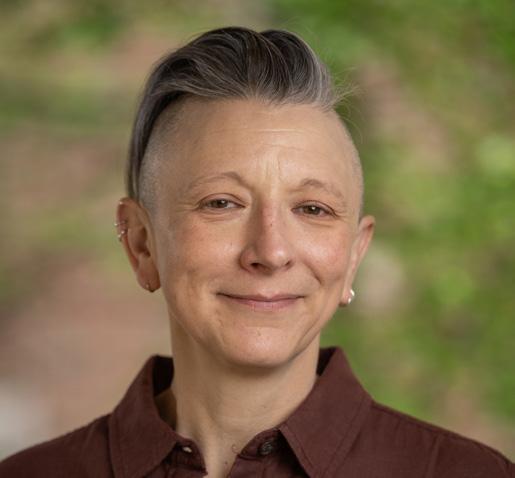
GINA BRANDOLINO
SUMMER FACULTY FELLOW
ENGLISH & SWEETLAND CENTER FOR WRITING; “Queer Horror: New Perspectives on the Chilling and Macabre”
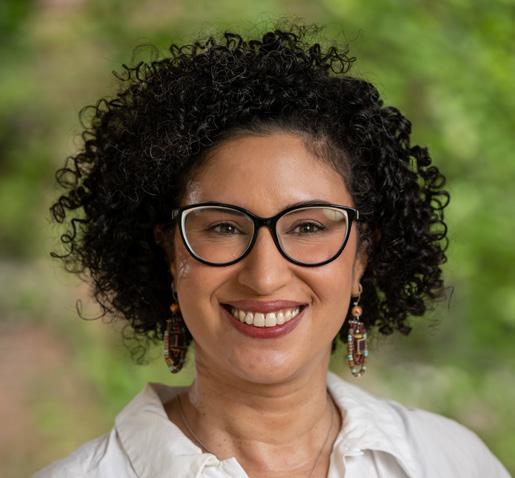
SUMMER FACULTY FELLOW ANTHROPOLOGY; “Regimes of Racialized Perception"

T HETZEL
SUMMER FACULTY FELLOW
SWEETLAND CENTER FOR WRITING; “The Flummox" (a zine series on perimenopause) and "14 Spencer Gardens" (a zine photo series on memory and aging)
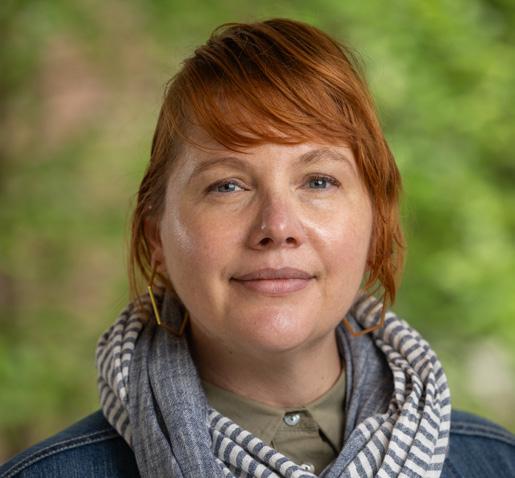
ANNICA CUPPETELLI
SUMMER FACULTY FELLOW
STAMPS SCHOOL OF ART & DESIGN; “The Jumpsuit: Challenging Gender Roles”
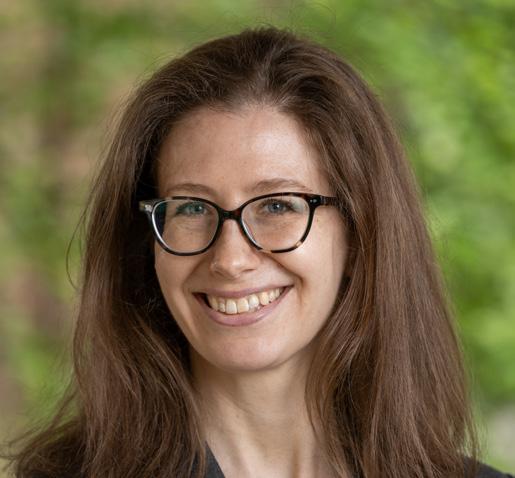
KATHERINE DAVIS
SUMMER FACULTY FELLOW
MIDDLE EAST STUDIES;“Writing Knowledge: Egyptian Grammar and Scholarship in the Late Period”
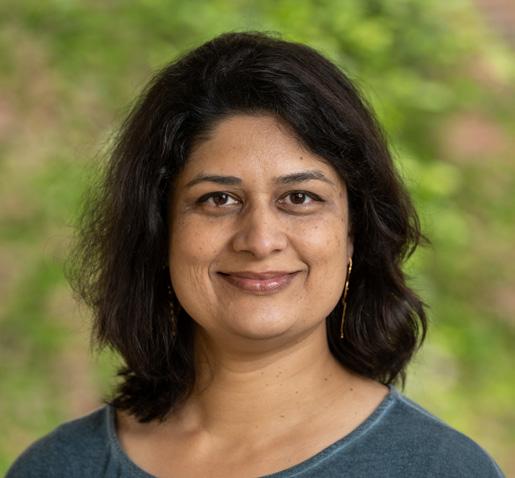
MADHUMITA LAHIRI
SUMMER FACULTY FELLOW
ENGLISH LANGUAGE & LITERATURE
“How We Hate Now: Xenophobia in the Age of Antiracism”

JOHN J. VALADEZ
SUMMER FACULTY FELLOW FILM, TELEVISION, & MEDIA; “The Latin Lens”
214 nuts and bolts used in the DigitalEngrams exhibition
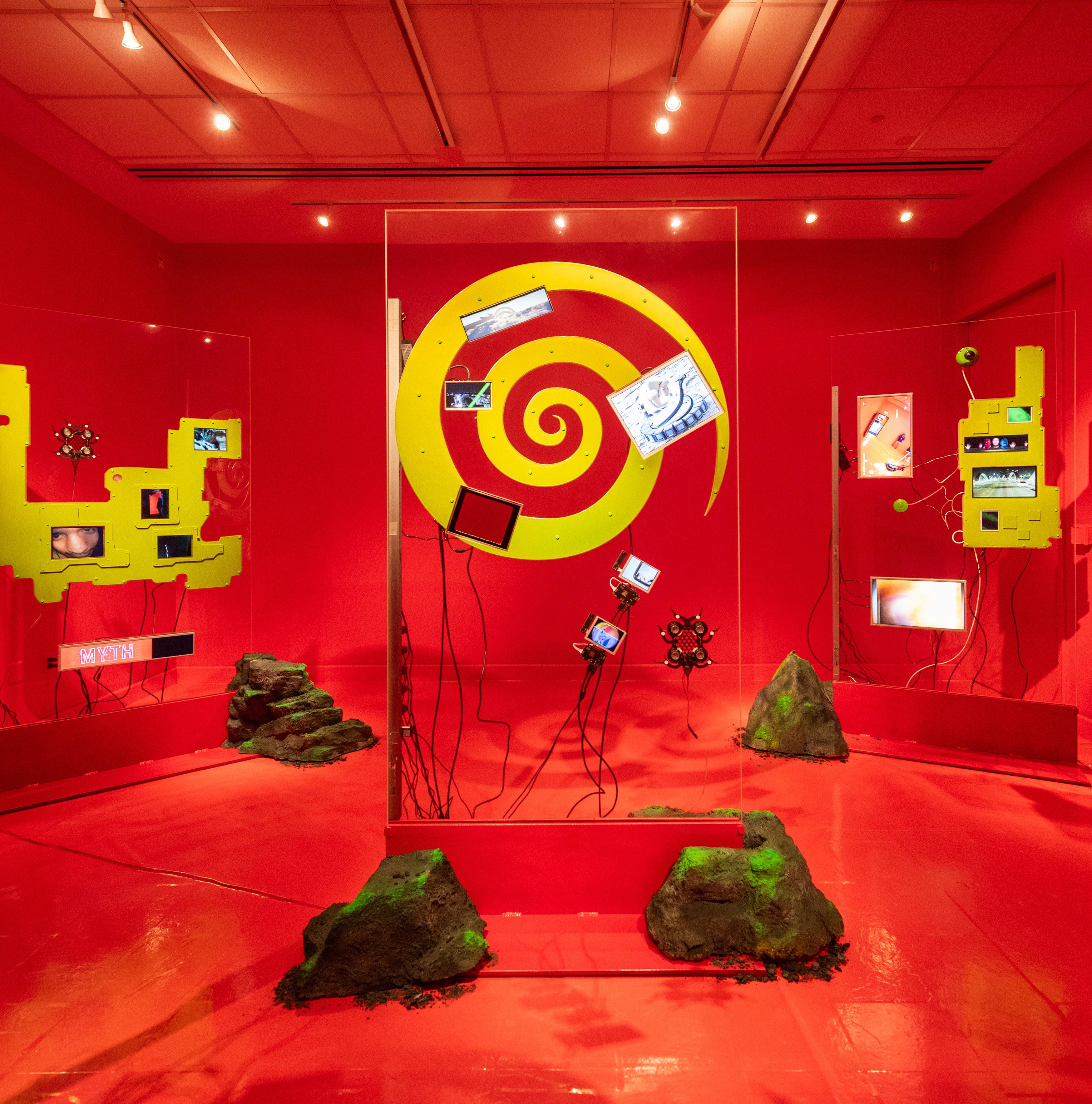
In 2023-24, the Institute for the Humanities Gallery remained a portal, informing humanities research within the university while also providing greater public access to more people. We have a longstanding commitment to social justice through the arts, emphasizing human connection and engagement through art as critical to undergraduate education in the humanities.
The gallery hosts 4-5 nationally and internationally recognized artists yearly in short-term residence. The exhibitions highlight the artists’ existing work or debut new site-specific installations created for the space. Scheduled class visits to the exhibitions bring in dozens of U-M classes and high school and college students from outlying communities. Faculty can integrate our exhibitions into their syllabi as teaching opportunities to enhance their curriculum. Our Public Humanities Interns also engage with the artists, planning innovative events to foster even greater undergraduate student engagement. Visiting artists also visit classrooms in outlying communities.
The year began with historied LA artist Teresa Tolliver, whose everyday practice of foraging for materials and creating sculptures over four decades exemplified the creative life as an art form in and of itself. In November, rising artist Gabriela Ruiz contemplated the relationship
“Thank you for hosting this very special lunch with Enrico and allowing the community to interact and understand the arts. I appreciate everything the Gallery does to make sure the arts thrive within our community.” Stamps in Color student
of memory and image to identity amidst an era of social media and iPhones. The winter term brought East Coast artist Enrico Riley who reminded us to take our time, with his contemplative abstract paintings that defied nameability. And in closing out the year, Detroit artist Susan Goethel Campbell’s meditative installation Garden Repairs was suggestive of the marks we make in tending to the garden and the self-care and sustenance found therein. The exhibition offered hope for renewal along the growing edge, even in times of profound uncertainty and upheaval. It brought close to home the impact of the arts not only in relation to scholarship but also to the collective human experience.
In addition to her work with artists and exhibitions, Krugliak again taught Humanities 311, “Provocations and Other Acts.” The course explores art and the humanities as potential catalysts for social justice. She also led a workshop for graduate students and faculty that explored how exhibition and visual strategies can extend the reach and accessibility of scholarly research.
The figurative assemblages in Harbingers of Dreams are life-size and were made from found and thrifted materials in a process Tolliver calls “creative recycling.” There is an inherent connection between these sculptures and the long-established history of African-American yard art, where plants, statuary, and artistic creations communicate themes of personal space, freedom of expression, and dreams of independence. Tolliver’s bold visual choices and material combinations are refusals of outside value judgments and hierarchies.

Teresa Tolliver is an artist who excels in ceramics, painting, and mixed media. She also has over 25 years of experience as an arts educator. A native of Los Angeles, Tolliver always wanted to be an artist, but “in the black neighborhood, you were not encouraged to be an artist because it’s not a steady career.” She eventually became a secretary and studied art at California State University, Northridge. She had been teaching ceramics for over ten years when she got a lesson in throwing from master ceramicist Michael Frimkess that sent her to the wheel for nine or ten hours every day. Similarly, she was teaching African wrap dolls when she discovered the wrap dolls of South America and their use of natural materials. Tolliver's work was recently included in Made in L.A. 2023: Acts of Living, the sixth iteration of the Hammer Museum’s biennial exhibition highlighting the practices of artists working throughout the greater Los Angeles area.
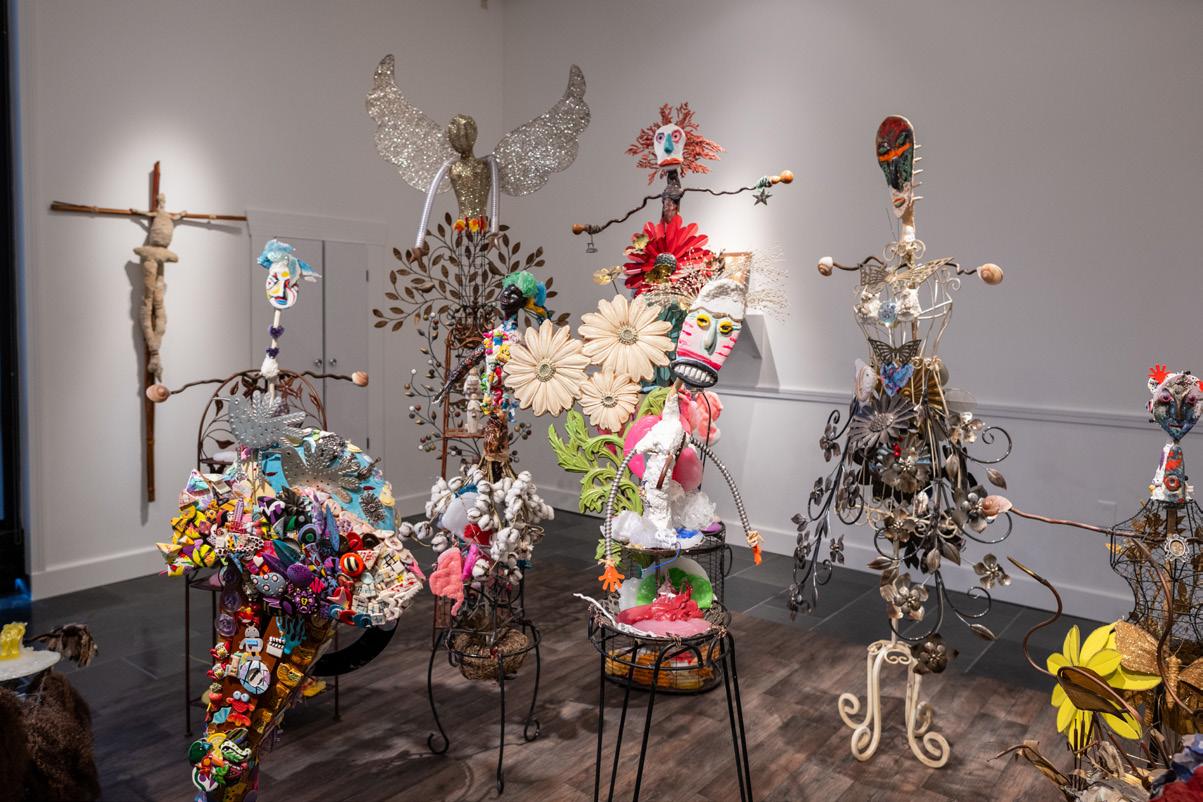
• Opening Reception with Teresa Tolliver
• Meet and Greet with Artist Demo, Trotter Multicultural Center
• Meet and Greet and Artist Demo, Institute for the Humanities
• Community Engagement with Tyree Guyton of the Heidelberg Project and Olayami Dabls of Dabls MBAD of the African Bead Museum, Detroit
Teresa Tolliver was the 2023 Paula and Edwin Sidman Fellow in the Arts.
In Digital Engrams, Gabriela Ruiz sources video from her phone and the internet, in combination with visceral color, sound, and sculptural elements to create an immersive environment that challenges our sensibilities. Massive slabs of plexiglass feel monolithic, like headstones. Powder-coated aluminum is suggestive of cell phone motherboards. A spiral engraving appears to reference an ancient symbol, while artificial rocks and moss imitate nature.
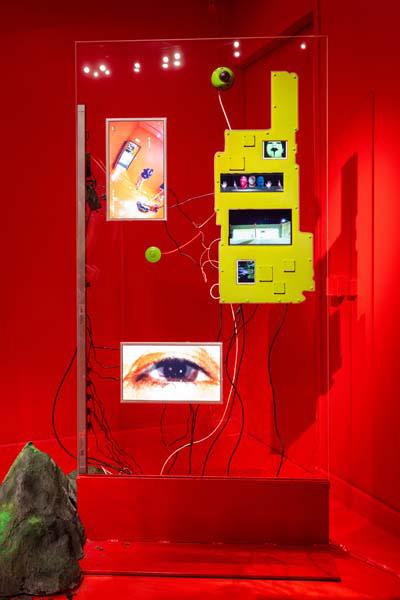
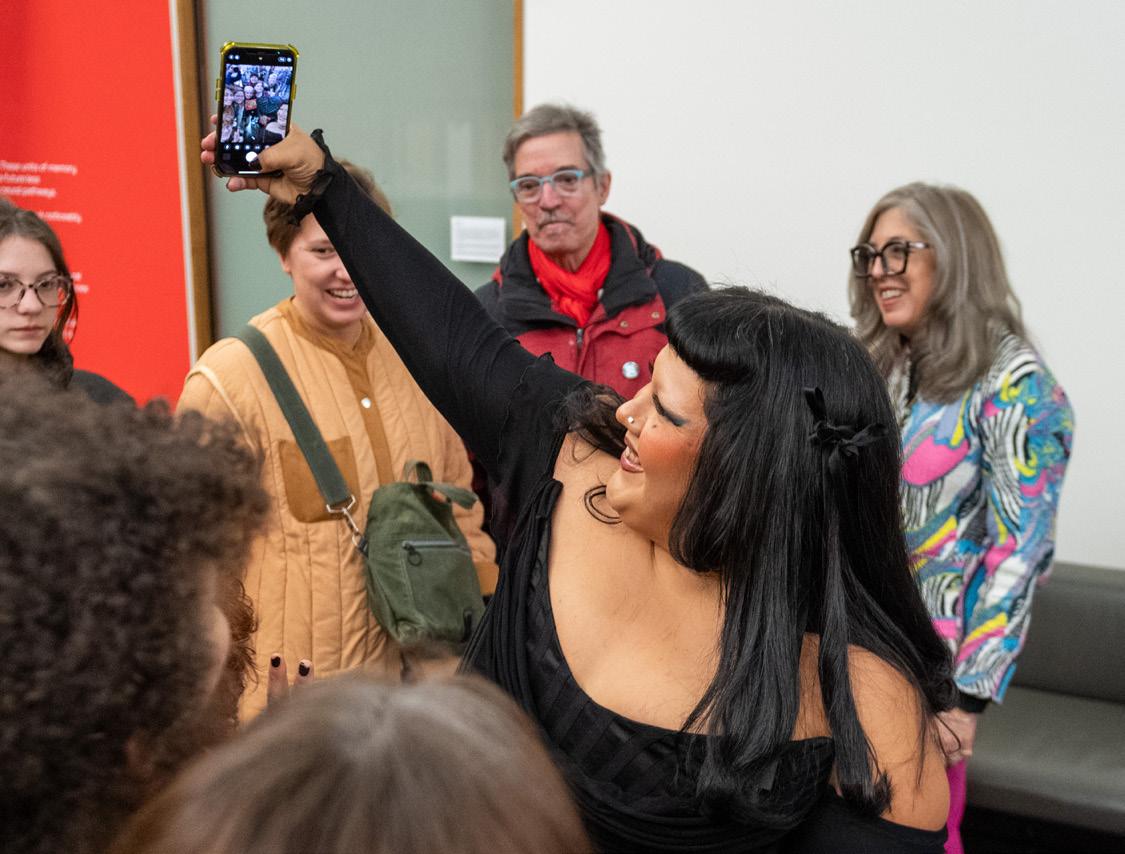
Ruiz’s installation hints at traces of the human experience yet is strangely devoid of any signs or proof of real life. It considers how images function on and off the screen, and how memories real and curated are at the crux of personal and cultural identity.
LA artist Gabriela Ruiz explores shifting ideas of home and sentiments of belonging through the lens of cultural, socioeconomic, and personal issues. Blending diverse forms of creative expression through performance, sculpture, and installation, she investigates her relationship to her body and emotions by building work that becomes the physical manifestation of her identity and psychological experience. Her practice reflects the DIY work ethic she was raised under, the vibrancy of Mexican cultural and artistic traditions, and her exposure to subculture and fantasy at a young age to escape the realities of daily life.
• Opening Reception with Gabriela Ruiz
• “Digital Engrams,” Gabriela Ruiz, Penny Stamps Speaker Series
• "Navigating Memory and Fantasy in the Digital Realm,” Woodward Lecture by Gabriela Ruiz, College for Creative Studies, Detroit
Ruiz was the 2024 Woodhead Visiting Artist.
Artist
Enrico Riley is best known for paintings that investigate violence and hope in cultural traditions in African American culture. His new work is personal and abstract. Started as an attempt to paint for himself, away from the center of things and off at the edges, they are from the spaces of private thought that slip into existence and just as easily slip away. They come from an internal conversation and contact with the world. "When I am with them," Riley explains, "I feel a tension between the spaces in the works being present but unnamed. The paintings allow me to observe myself looking. I am acutely aware of time. Maybe they are an invitation to speculate."
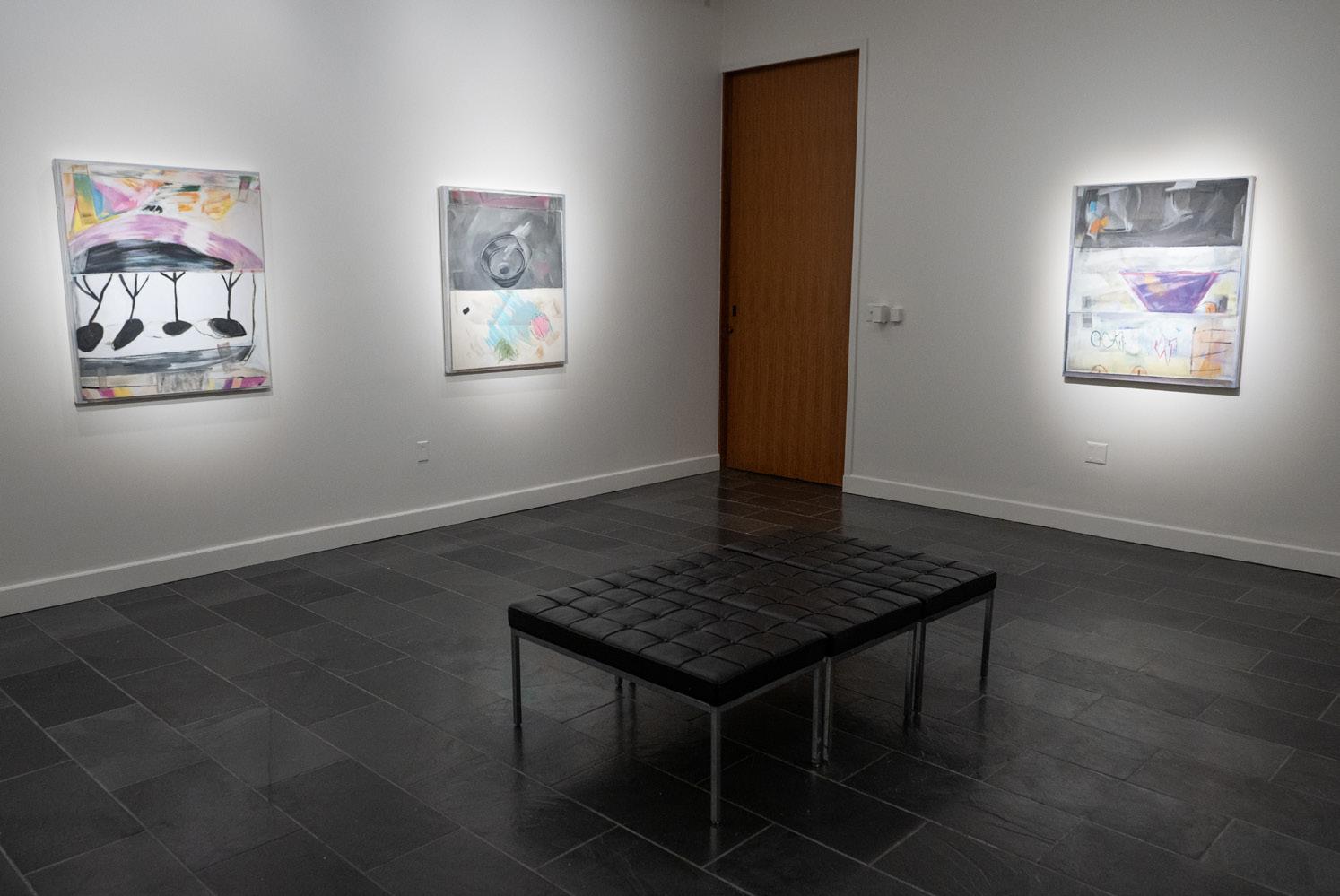
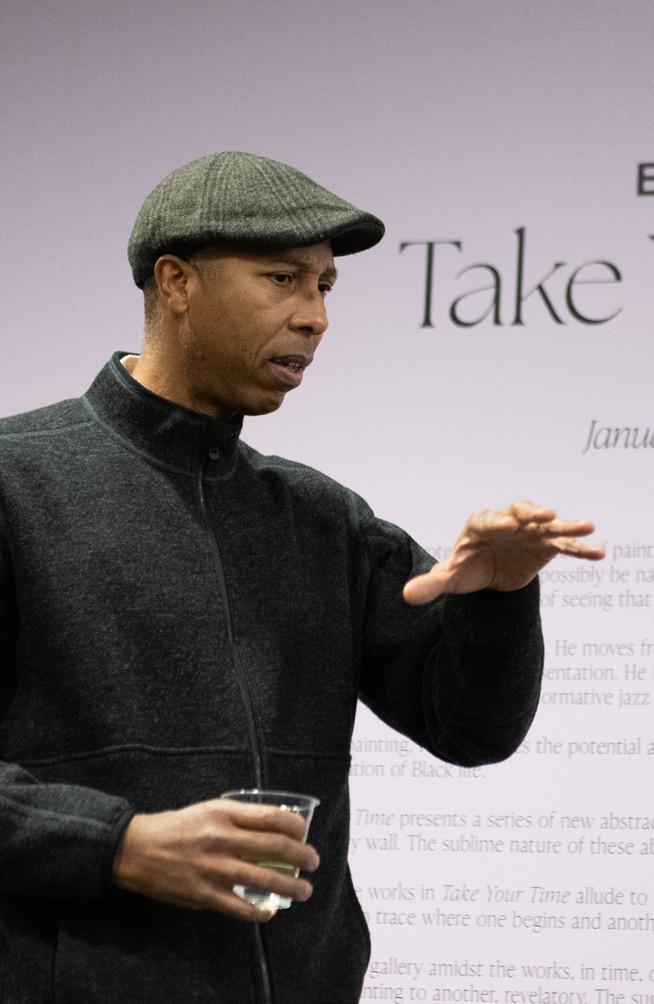
Enrico Riley is the recipient of a Guggenheim Fellowship, the Rome Prize in Visual Arts, the American Academy of Arts and Letters Purchase Prize in Painting, and holds the George Frederick Jewitt Professorship in Art at Dartmouth College. Riley has been the subject of solo exhibitions and has participated in recent group exhibitions at Crystal Bridges Museum of Art and The Hood Museum. His work is in institutions including the Virginia Museum of Fine Arts, the Hood
Museum, and the Nasher Sculpture Center. Riley has an MFA in painting from Yale University and a BA in Visual Studies from Dartmouth College.
• Opening Reception with Enrico Riley
• “Take Your Time: A Fireside Chat with artist Enrico Riley,” U-M Detroit Center
• “The Nameable and the Unseen,” Enrico Riley, Penny Stamps Speaker Series
• Meet and Greet with Stamps In Color student group
Take Your Time was made possible by a grant from the Mellon Foundation as part of the Institute for the Humanities' multi-year High Stakes Art initiative.
susan goethel campbell
For the installation Garden Repairs, Campbell meditates on the natural cycles of the garden as potentially reparative and offering perspective in a present day of precarity and loss. Ephemeral paper works created using natural dyes, woodblock printing, and hand sewing embrace impermanence. Vivid yellow pigment like bee pollen stains the wall. In juxtaposition, an architectural structure patterned after the blueprint of the Thayer Academic Building hangs from the ceiling, conjuring up future worlds where buildings become elaborate seed banks and growing systems. As man-made structures falter and fail, organic materials housed within them are activated, making way for new growth and sustenance.
Susan Goethel Campbell is a multi-disciplinary artist and printmaker based in metropolitan Detroit. Her process-based work considers the dynamic qualities of the built environment to include periods of growth, decline, and dormancy. Central to Campbell’s practice are questions surrounding the integration and erasure of human agency over broader global systems. She often works with ephemeral materials intended to erode and change over time. Her work is realized in several formats, including prints, drawings, artist books/objects, photographs, video, and installation.
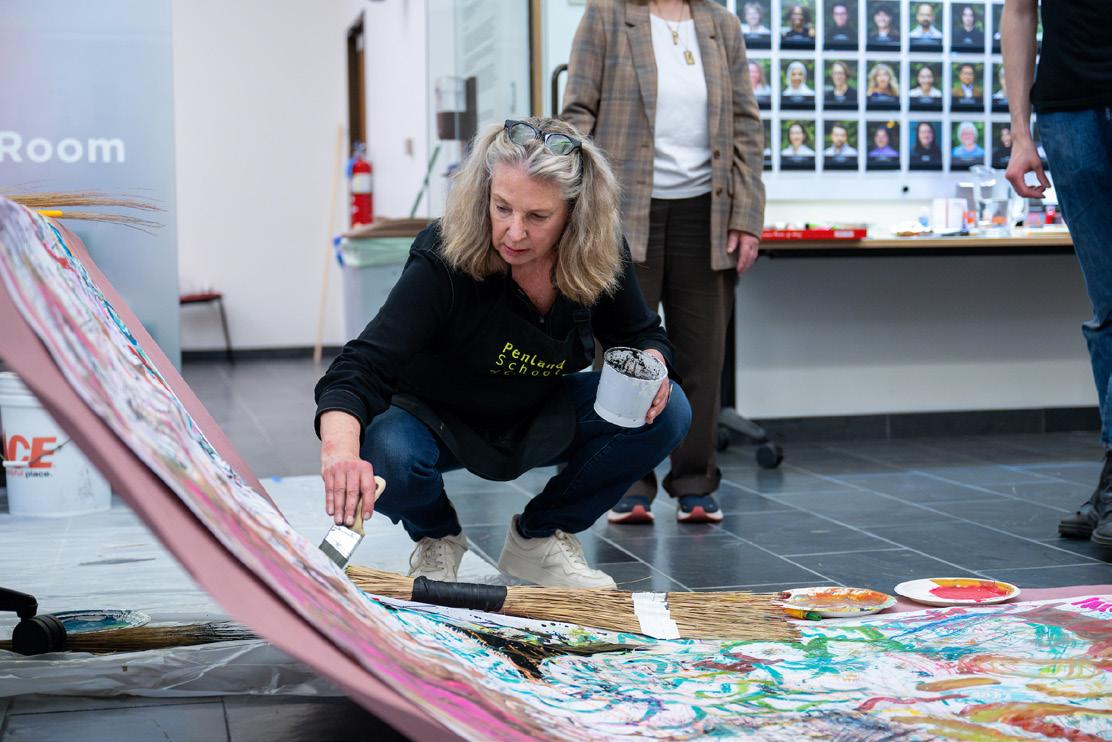
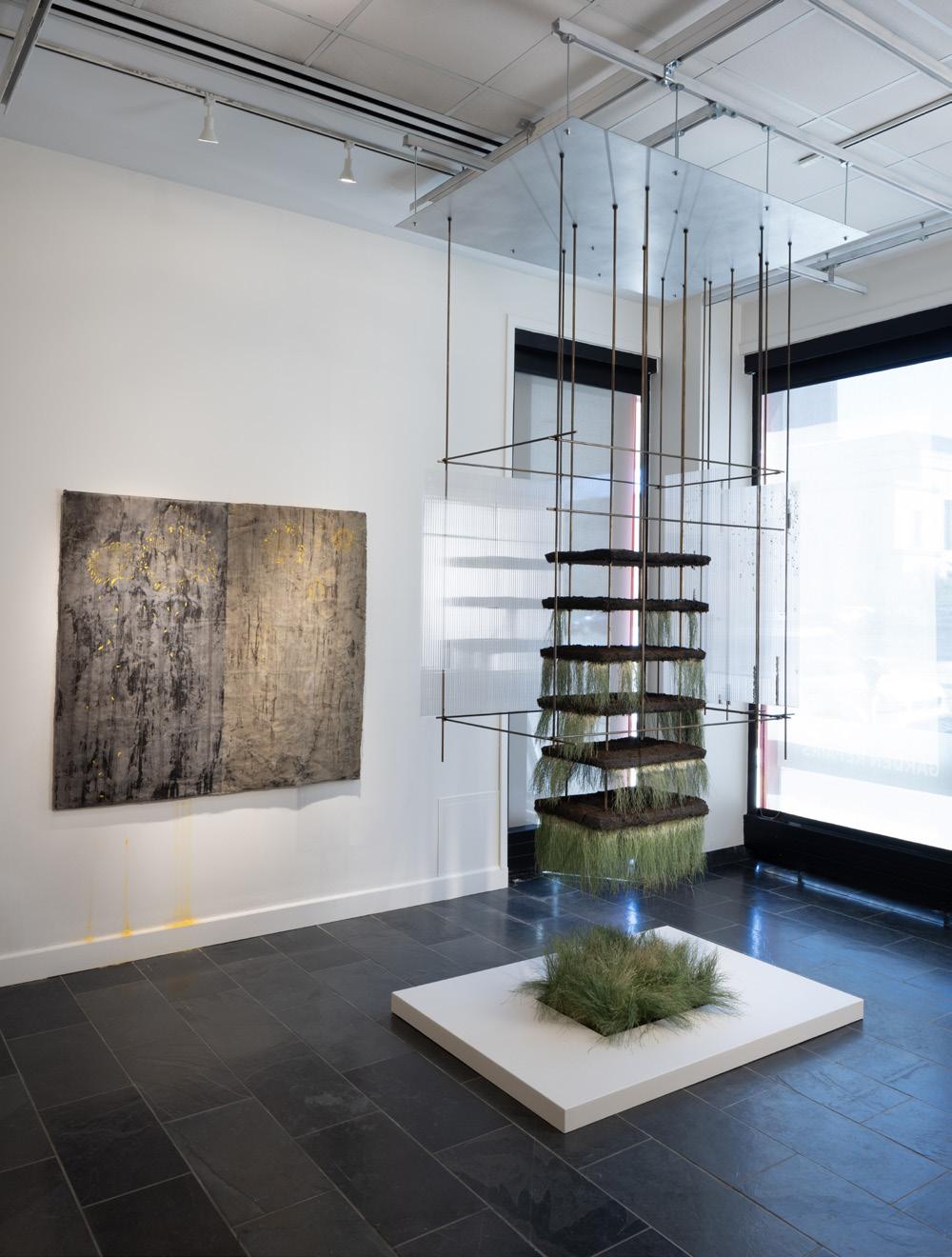
• Opening Reception with Susan Goethel Campbell
• “Seeds of Impermanence,” Susan Goethel Campbell, Penny Stamps Speaker Series
• “Susan Goethel Campbell's Artists' Books,” reception, M Library Special Collections
Garden Repairs was made possible by a grant from the Mellon Foundation as part of the Institute for the Humanities' multi-year High Stakes Art initiative.
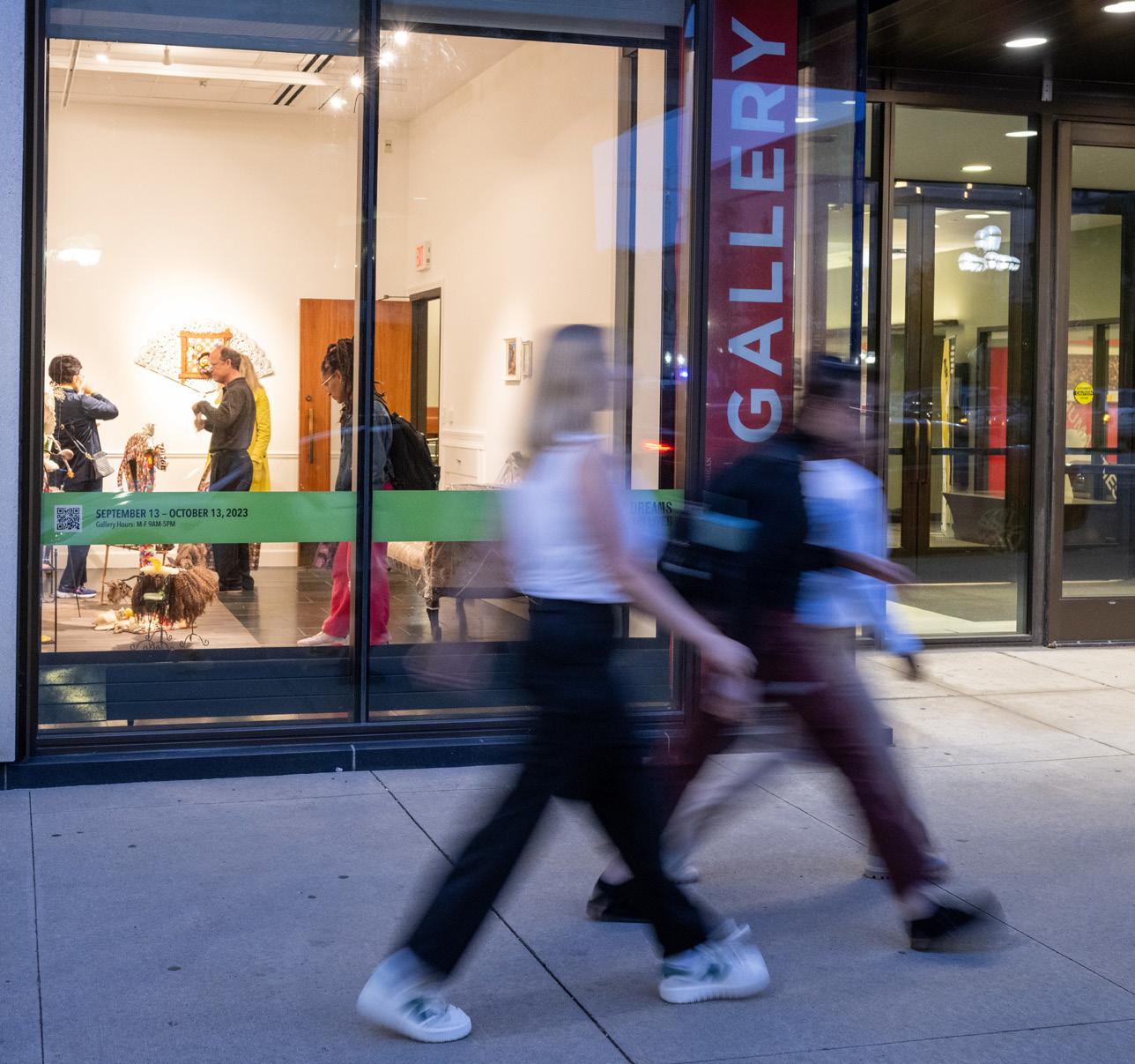
The Institute for the Humanities Gallery is a unique meeting place for the exchange and interchange of ideas. Each exhibition serves as a starting point for collaboration and critical inquiry, bringing to the institute new perspectives that bridge the humanities and the arts. In addition to providing an exhibition venue for artists, the gallery also offers fellowships, providing artists the time and support to create new work while in shortterm residence and to engage with students and faculty on campus.
The institute’s museum-quality gallery has gained national attention for its curated shows each year. Gifts in any amount can help to ensure that our gallery continues a tradition of exhibitions that showcase the synergies between the work of humanities scholars and creative artists. Our exhibitions feature emerging as well as established artists, often with an emphasis on social justice issues.
Fully funding the gallery would ensure not only the future of our exhibition program, but also enable the institute to expand its outreach by multiplying sites of curation across campus and in digital environments, and reaching beyond the campus to new audiences. A gift to endow the gallery would provide a naming opportunity.
One of the easiest ways to support the humanities is through an outright gift to the Institute for the Humanities. The University of Michigan makes giving such gifts very easy through its secure gift website (https://giving.umich.edu/um/make-a-gift). Enter fund number 700976 in the search field to support the gallery in perpetuity.
16
fields of study represented by our Public Humanities Interns
units of grass grown in post-consumer plastics for GardenRepairs
To discuss establishing an endowment or bequest in detail please contact the institute at humin@umich.edu or 734.936.3518.
The Public Humanities Internship, established in 2021, is a paid internship program that provides eight selected undergraduate students at the University of Michigan with the unique opportunity to participate in the life of the Institute for the Humanities. Guided by the assistant director for undergraduate student engagement and marketing, interns interact with faculty, curators, staff, visiting artists, and other members of our community to explore humanities topics and ideas. They then turn those conversations into humanities-related programs and events that engage undergraduate students with the humanities.
Throughout the program, interns participate in enriching sessions with campus humanities professionals such as graduate student fellow Anna Almore, U-M arts communications manager Jamie Sherman Blinder, Norman Freeling Visiting Professor Jodi
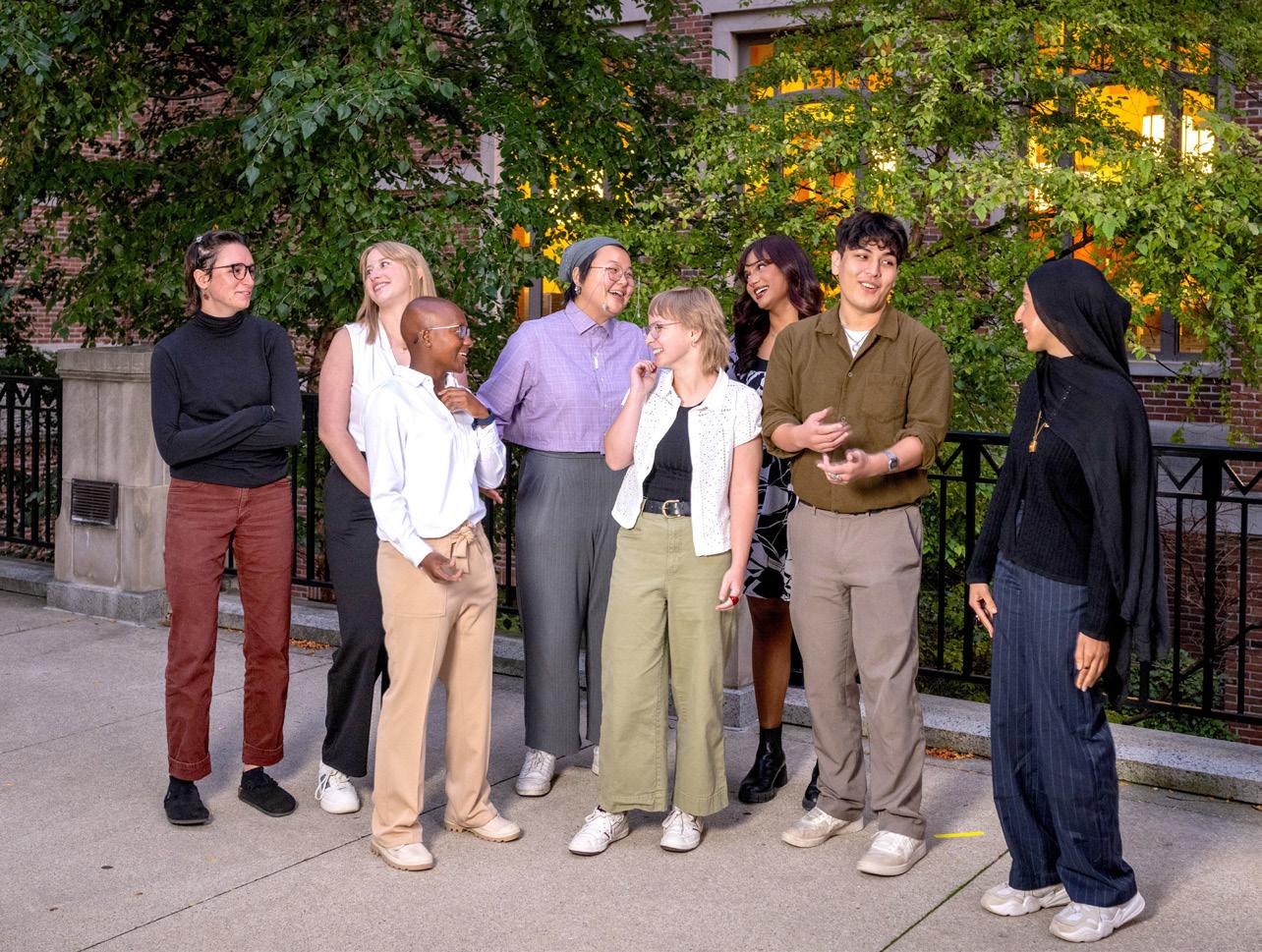
Melamed, and political science professor and Ann Arbor city council member Lisa Disch, among others. These interactions not only expose interns to various career paths within the humanities but also encourage them to ask thought-provoking questions and expand their professional networks.
Interns are accountable for every aspect of their projects, from initial concept to final execution. Throughout the process, they acquire and enhance skills in event planning, marketing and communications, teamwork, and leadership. We’re excited to see what ideas, skills, and energy our next cohort bring when the internship begins in September.
The internship program and intern projects are made possible by the Edna Balz Lucy and Hewlett Foundation endowments.
Leads: Sabahat Haidari and Leah Driehorst
This Instagram photo contest helped publicize the "Snapshots & Straight Talk: Devin Allen in Conversation with Imani Mixon" event and allowed students who participated to engage with photographer Devin Allen's work and attend a dinner with him to talk about his life and work in an intimate setting. The two Instagram reels created to promote the contest had a whopping 10k+ plays.
Leads: Evalicia Chavez, SJ Shin, Moshay Turner
The Study Days events were an opportunity to welcome students to the institute and promote our events and programs while offering a comfortable space for students to prepare for finals. Interns provided refreshments, created a decompression room, and opened the gallery for students who wanted to take a break from academic work.
Leads: Sabahat Haidari and Leah Driehorst
What is the official language of Algeria? Where is the Van Gogh Museum located? Who starred in the 1996 remake of Romeo and Juliet? Our two humanities trivia events brought dozens of students into the building to test their humanities knowledge, learn about the institute, and win prizes from local humanities-related businesses.
Leads: Mikey Delphia and SJ Shin
This popular event, held on Valentine’s Day, was an opportunity for undergraduate students to engage with Enrico Riley’s exhibition in the gallery and express their creativity through art. Interns organized exhibition tours, provided paint supplies and pizza, and took pictures of attendees at the Polaroid photo booth they created.

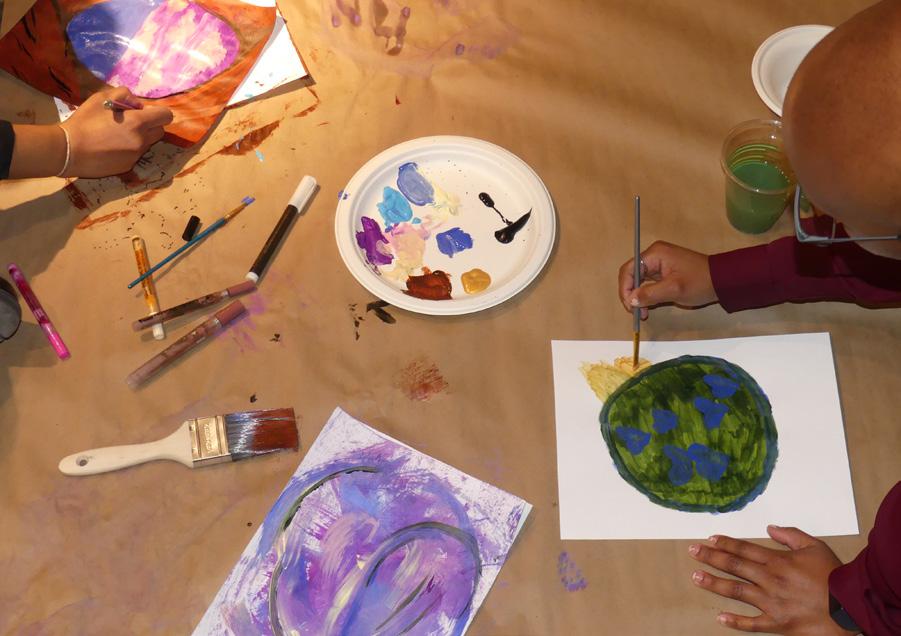
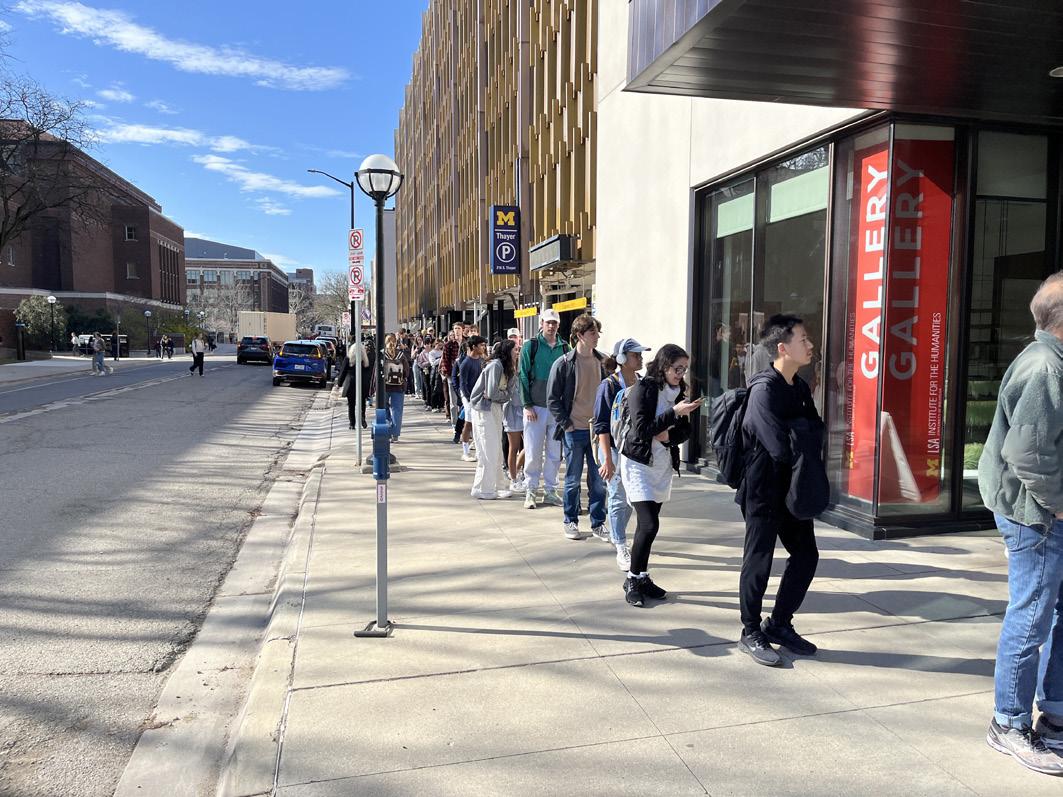
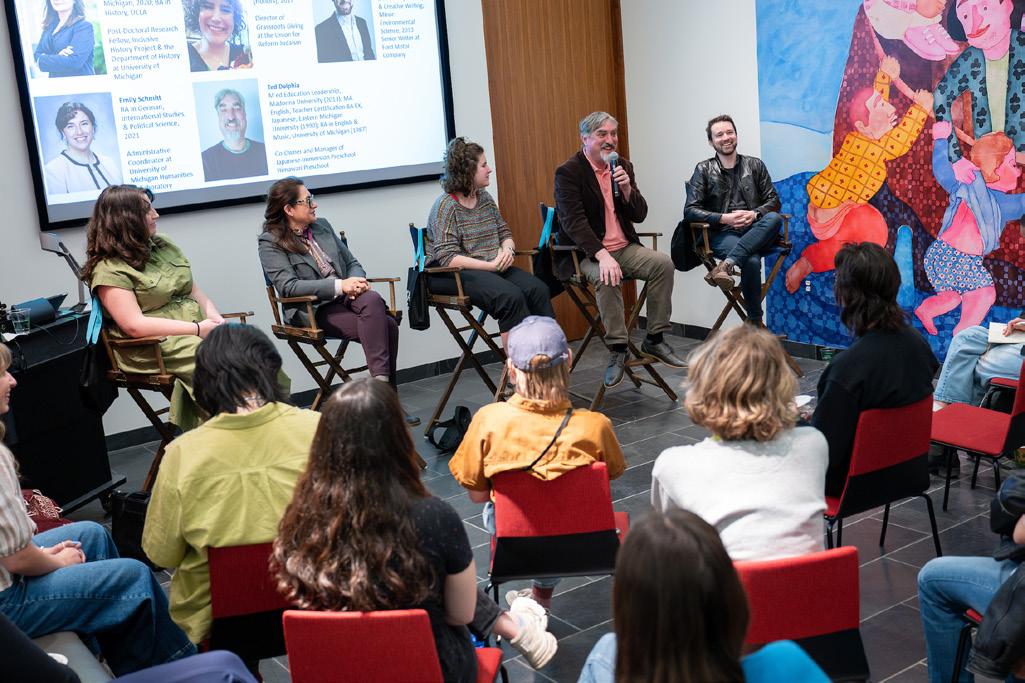
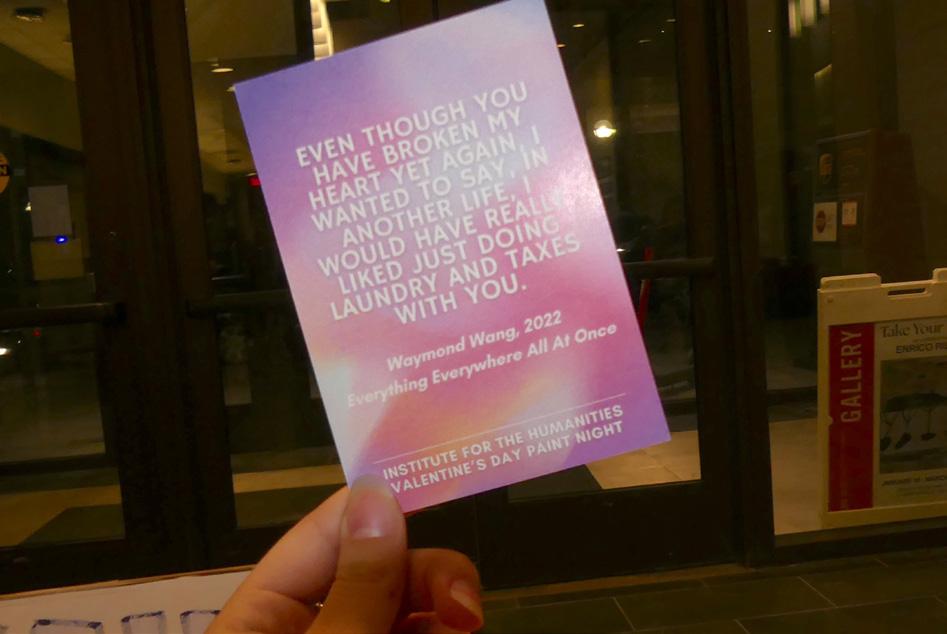
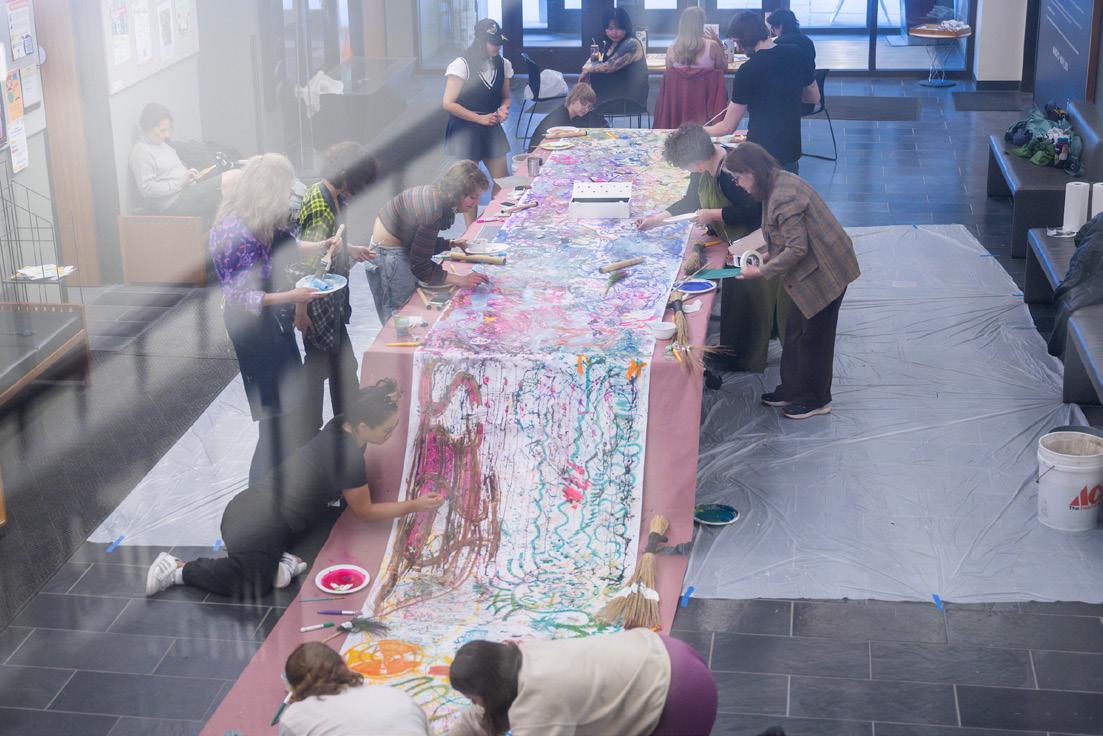
Leads: Mikey Delphia, SJ Shin, Evalicia Chavez
The lure of free solar eclipse glasses brought over 1000 students to the Institute to learn about the Public Humanities Internship Program, grab a donut, and pick up a pair of solar eclipse glasses for the April 8 astronomical event.
Leads: Ayat Tolba, Leah Driehorst, Sabahat Haidari
This annual career panel features U-M alumni from various disciplines and careers who are putting their humanities degrees to work.
• Lorena Chambers (PhD, MA in U.S. History, University of Michigan, 2020; BA in History, UCLA), Post-Doctoral Research Fellow, Inclusive History Project and the Department of History at the University of Michigan
• Ted Delphia (MEd Education Leadership, Madonna University (2013); MA English, Teacher Certification BA EX, Japanese, Eastern Michigan University (1990); BA in English & Music, University of Michigan (1987)), Executive Director at Michigan Japanese Bilingual Education Foundation
• Gabi Kirsch (BA in Sociology and French (Honors), 2017), Director of Grassroots Giving at the Union for Reform Judaism
• Emily Schmitt (BA in German, International Studies, & Political Science, 2021), Administrative Coordinator at University of Michigan Humanities Collaboratory
• Jeff Waraniak (BA in English Language & Literature (Honors) & Creative Writing; Minor: Environmental Science, 2013), Senior Writer at Ford Motor Company.
Leads: Cassidy Brimer and Moshay Turner
Interns collaborated with visiting artist Susan Goethel Campbell and curator Amanda Krugliak on this event inspired by the natural cycles of the garden. Attendees toured Campbell’s exhibition Garden Repairs, and then Campbell guided the students through painting prompts meant to engage and inspire. The final result was a collaborative scroll that we installed on the wall of the Osterman Common Room.
376 slices of pizza served at the intern-led Study Days events
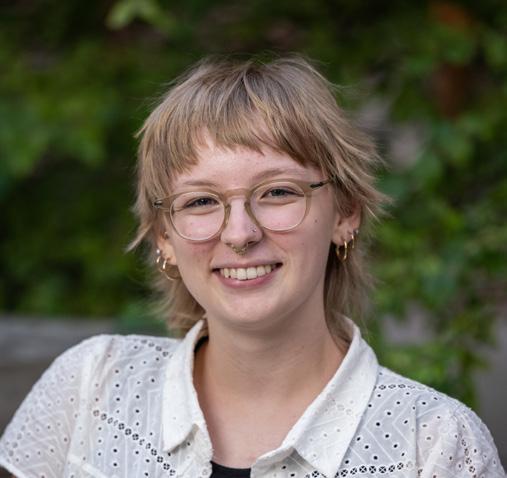
CASSIDY BRIMER
MAJOR: COMMUNICATIONS AND MEDIA
MINOR: GENDER, RACE, AND NATION
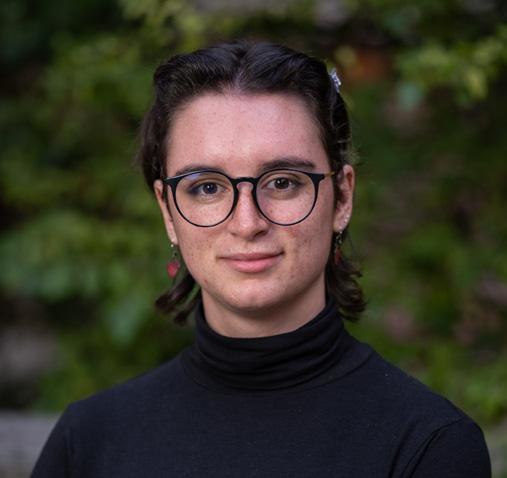
EVALICIA CHAVEZ
MAJORS: ANTHROPOLOGY, HISTORY OF ART
MINOR: MUSEUM STUDIES
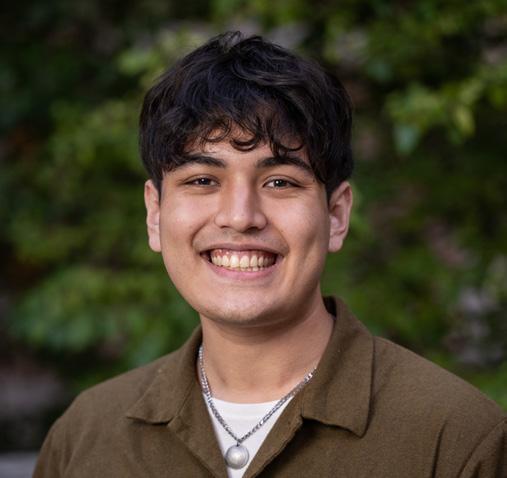
MICHAEL DELPHIA
MAJORS: ASIAN STUDIES, ECONOMICS

LEAH DRIEHORST
MAJOR: HISTORY
MINOR: FRENCH
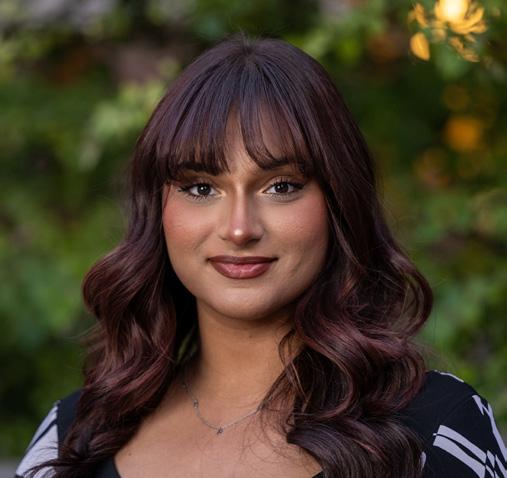
SABAHAT HAIDARI
MAJOR: EVOLUTIONARY ANTHROPOLOGY

MAJORS: SOCIAL THEORY & PRACTICE, ARTS AND IDEAS IN THE HUMANITIES
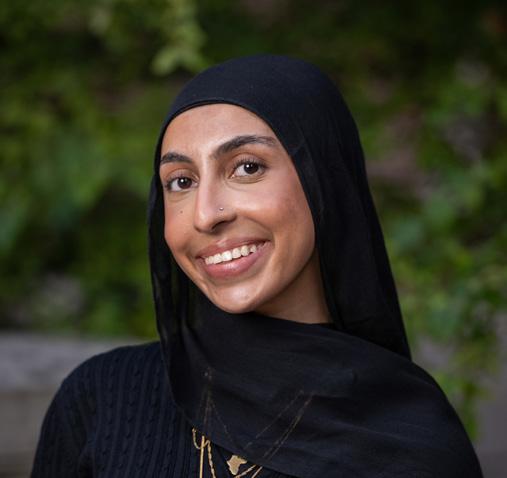
AYAT TOLBA
MAJOR: POLITICAL SCIENCE
MINORS: UX DESIGN, MIDDLE EAST STUDIES
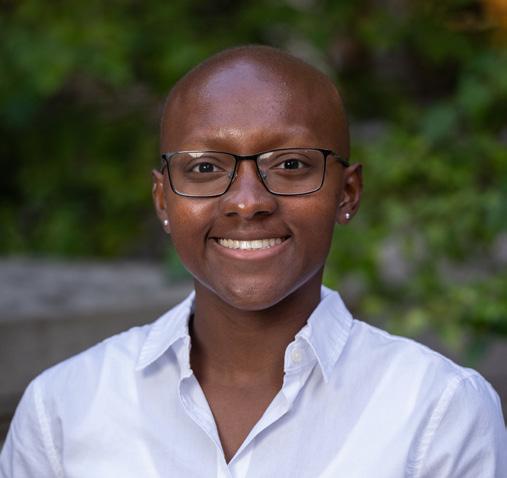
MOSHAY TURNER
MAJOR: COGNITIVE SCIENCE
a lens to understand the world
2023-24 Public Humanities Intern
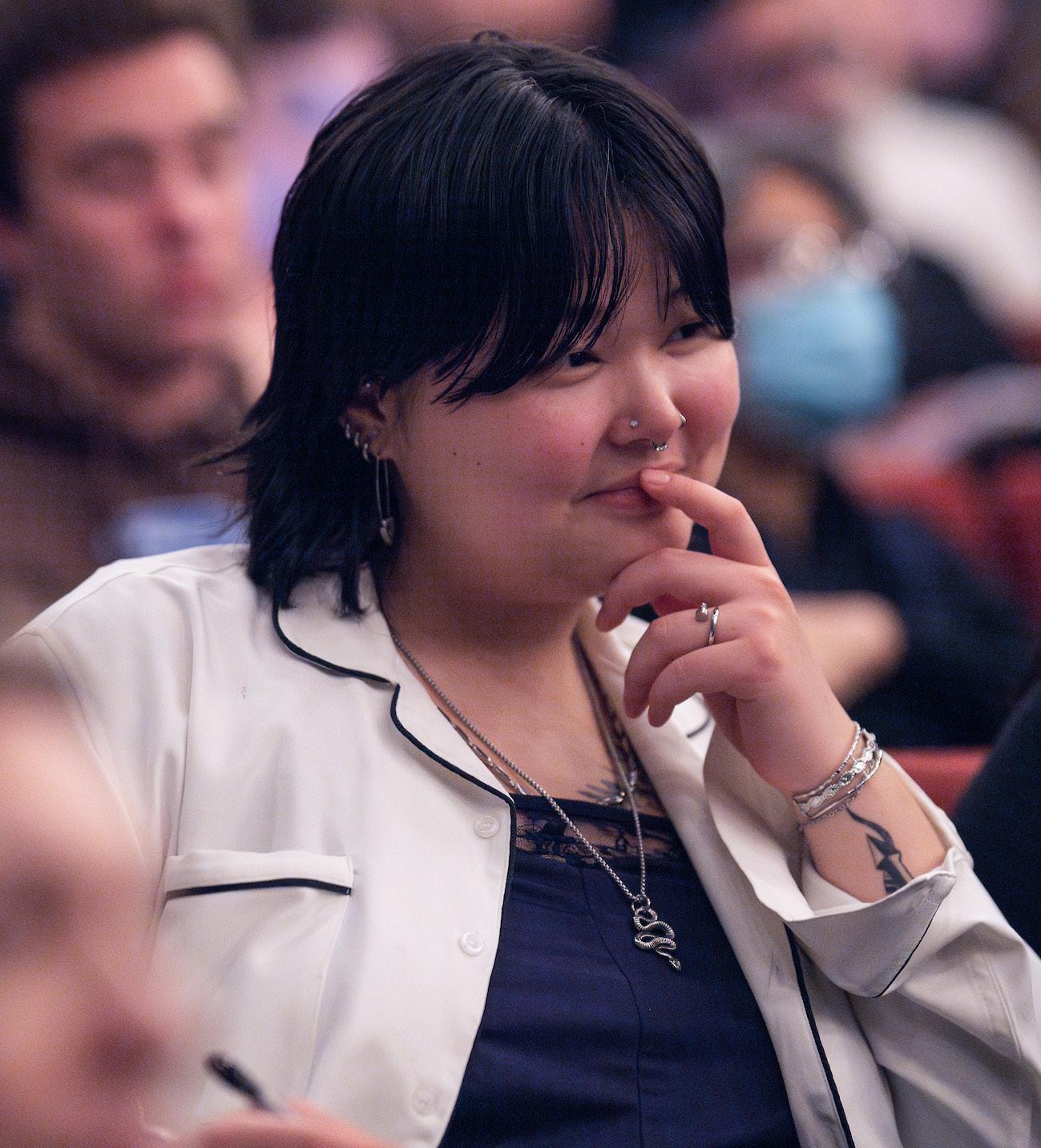
My first time interacting with the Institute for the Humanities was on the side of the street in Sevilla, Spain, just outside a sangria-tasting spot. It was depressingly gloomy—much like today, as I write this piece—and I scampered off to find a decent background for my Zoom interview with assistant directors Stephanie Harrell and Shaunda Bunton. I told them of my unfortunate predicament and unconventional setting for a job interview, kickstarting the long series of conversations I would have with them both over the course of our two semesters together.
I later found out that Stephanie and Shaunda started asking their interviewees where they were located during their Zoom interviews. Some were abroad like I was, some across the country, others spending their summers in sunny Ann Arbor. This set the tone for the eclectic group of interns I now call my friends; our diverse interests and experiences made our work meetings and shifts all the more fun, with ideas ricocheting off each other.
Although working with my co-interns was one of the best parts of the job, so was being able to meet the visiting artists and getting to know the fellows spending their year on research and writing. I especially remember conversations with Anna Almore, Manan Desai, and Jodi Melamed. Their work—which cuts across care work in education, music and cultural history, decolonial studies, and racial capitalism—has reinspired me by highlighting the role of the humanities in academics and as a lens to understand the world. I must also give a shout-out to curator Amanda Krugliak and administrative coordinator Asma Baban! A big thank you to Amanda for working with us on events related to the gallery and Asma for the many conversations during my shift and for always getting our supplies together.
I leave the Institute for the Humanities with a great deal of gratitude and a little sadness for not being able to return as an intern next year. My time has been filled with joy, laughter, and experience working within the public humanities. I will definitely return to the Thayer Academic Building for future events and study sessions, and to say hello to the staff. Thank you to the institute for hosting me this year. I’ll see you again soon.
-SJ Shin is a rising senior with a double major in social theory & practice and arts & ideas in the humanities.
200+
artifacts showcasing the rich history and legacy of Black music at the Black History 101 Mobile Museum
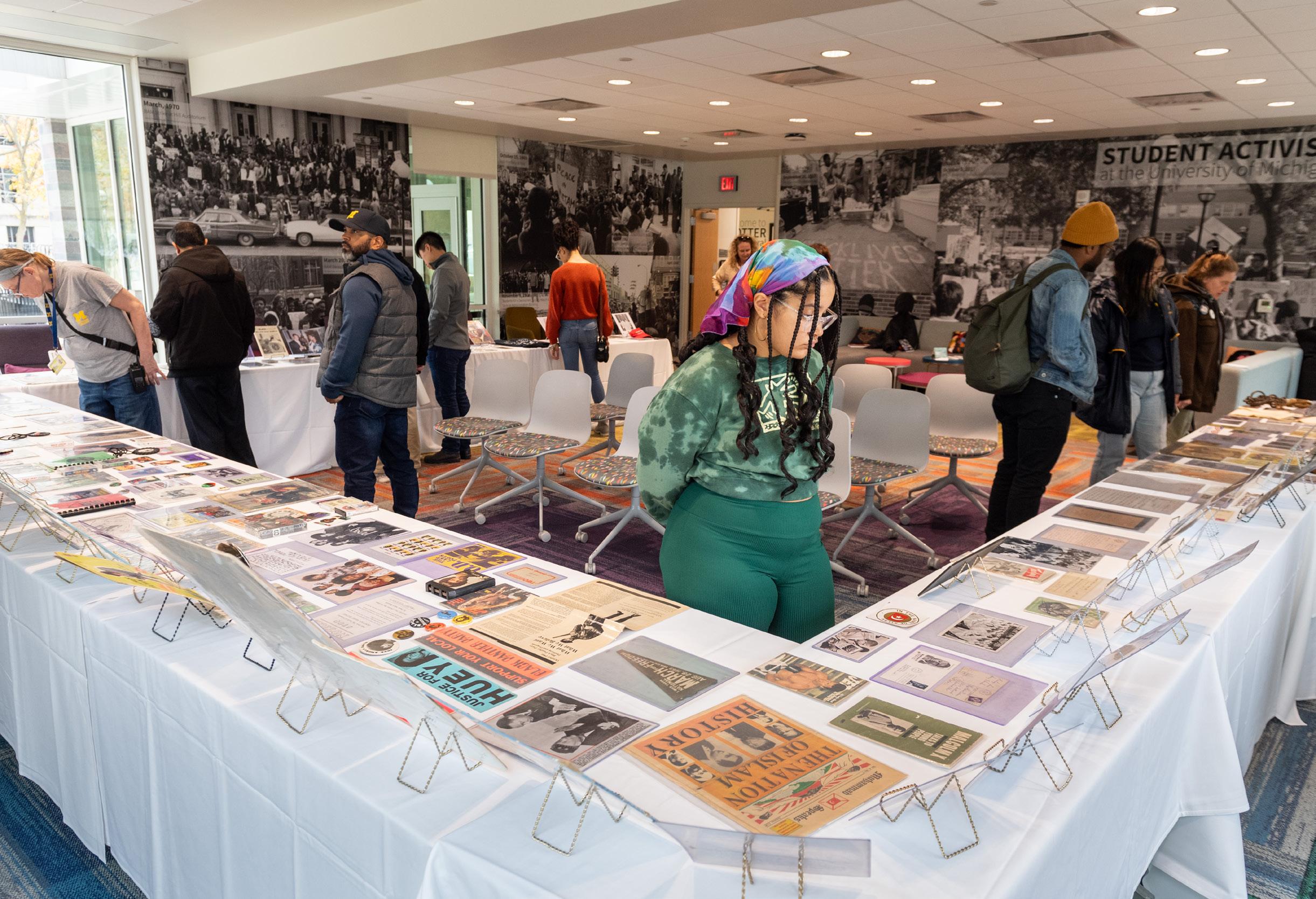
Black
C elebrating the power of hip hop to educate, uplift and empower.
BLACK HISTORY 101 MOBILE MUSEUM
"USING HIP-HOP ARTIFACTS TO UNDERSTAND HIP-HOP CULTURE AND ITS CONNECTION TO BROADER BLACK SOCIAL, CULTURAL, AND POLITICAL MOVEMENTS" with Dr. Khalid Hakim
BLACK HISTORY 101 MOBILE MUSEUM'S MUSIC OF THE MOVEMENT EXHIBITION
CITIZEN
a performance by KHALFANI. as part of Music of the Movement
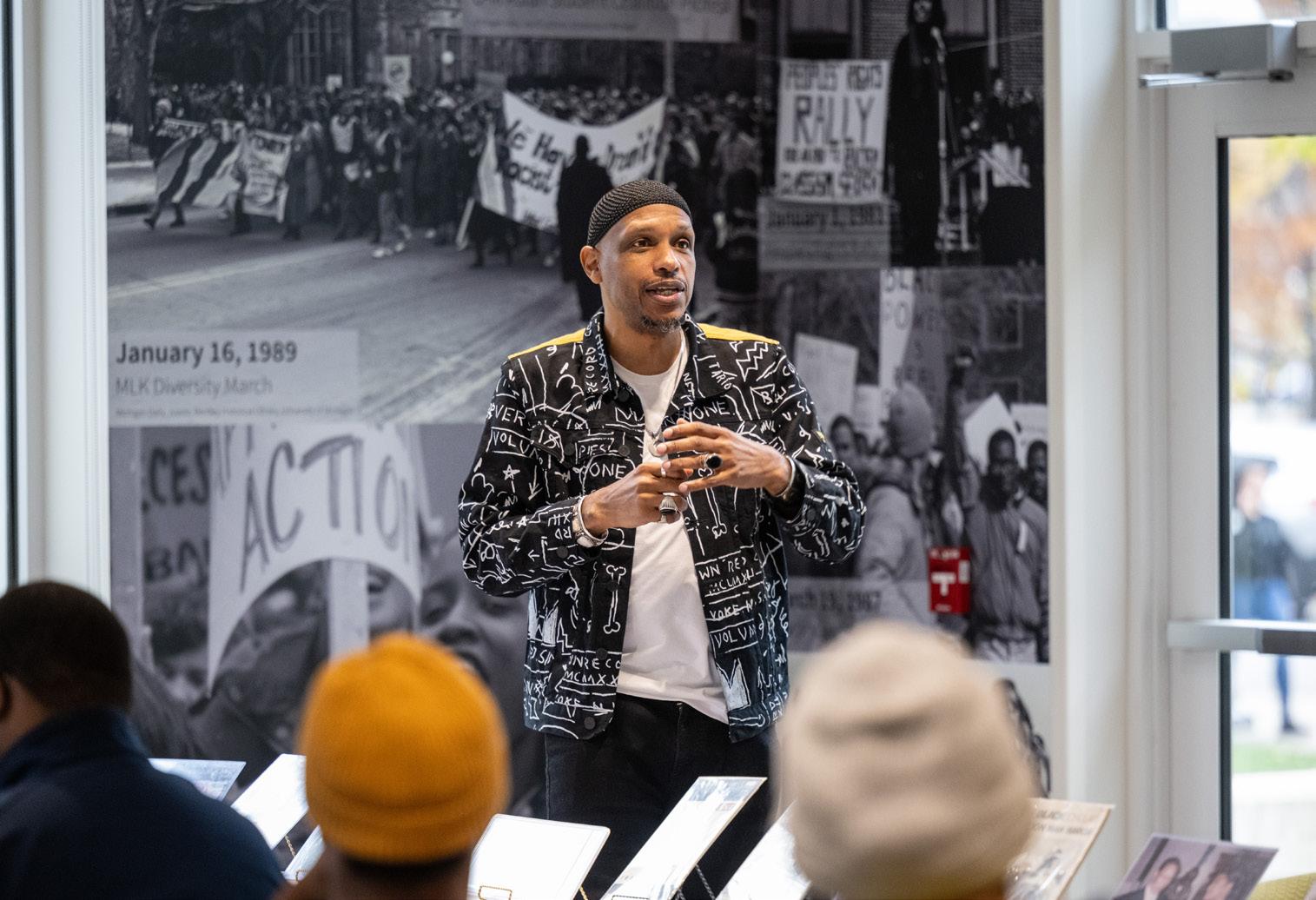
Workshops for humanities graduate students.
"HUMANITIES MINDSETS" with Derek Attig and Mearah Quinn-Brauner
1000 Solar eclipse glasses distributed at the interns’ Solar Eclipse & the Humanities event
"COVER LETTERS AND RESUMES FOR DIVERSE CAREER PATHWAYS IN THE HUMANITIES" with Kirsten Elling and Joe Cialdella
"NETWORKING AND INFORMATIONAL INTERVIEWING FOR DIVERSE CAREER PATHWAYS IN THE HUMANITIES" with Kirsten Elling and Joe Cialdella
with U-M Humanities PhD alumni
• Jill Jividen, Senior Director of Research Development at the University of Michigan
• Michelle-May Curry, Curator at the D.C. Commission on the Arts and Humanities
• Jamie Hart, Executive Director at the Coalition to Expand Contraceptive Access
HEAR, HERE: HUMANITIES UP CLOSE
S hort talks by current faculty fellows followed by Q & A.
"SPIRITUAL ABUSE, SCATTERED SOULS, AND SACRED CHAOS"
Nancy Khalil, American Culture
"RADICAL VERNACULAR"
Mireille Roddier, Architecture, Women's and Gender Studies
"UNMASKED: A HISTORY OF THE INDIVIDUALIZATION OF RISK"
Greta Krippner, Sociology
"FREEDOM AND SEXUAL PERIL IN CHARLOTTE FORTEN’S CIVIL WAR DIARY 1862-1863"
Sandra Gunning, English Language and Literature, American Culture, Women’s and Gender Studies, Afroamerican and African Studies
"WRITING, SLAVERY, AND INDIGENOUS SOVEREIGNTY IN QING DYNASTY SOUTHWEST CHINA"
Erik Mueggler, Anthropology
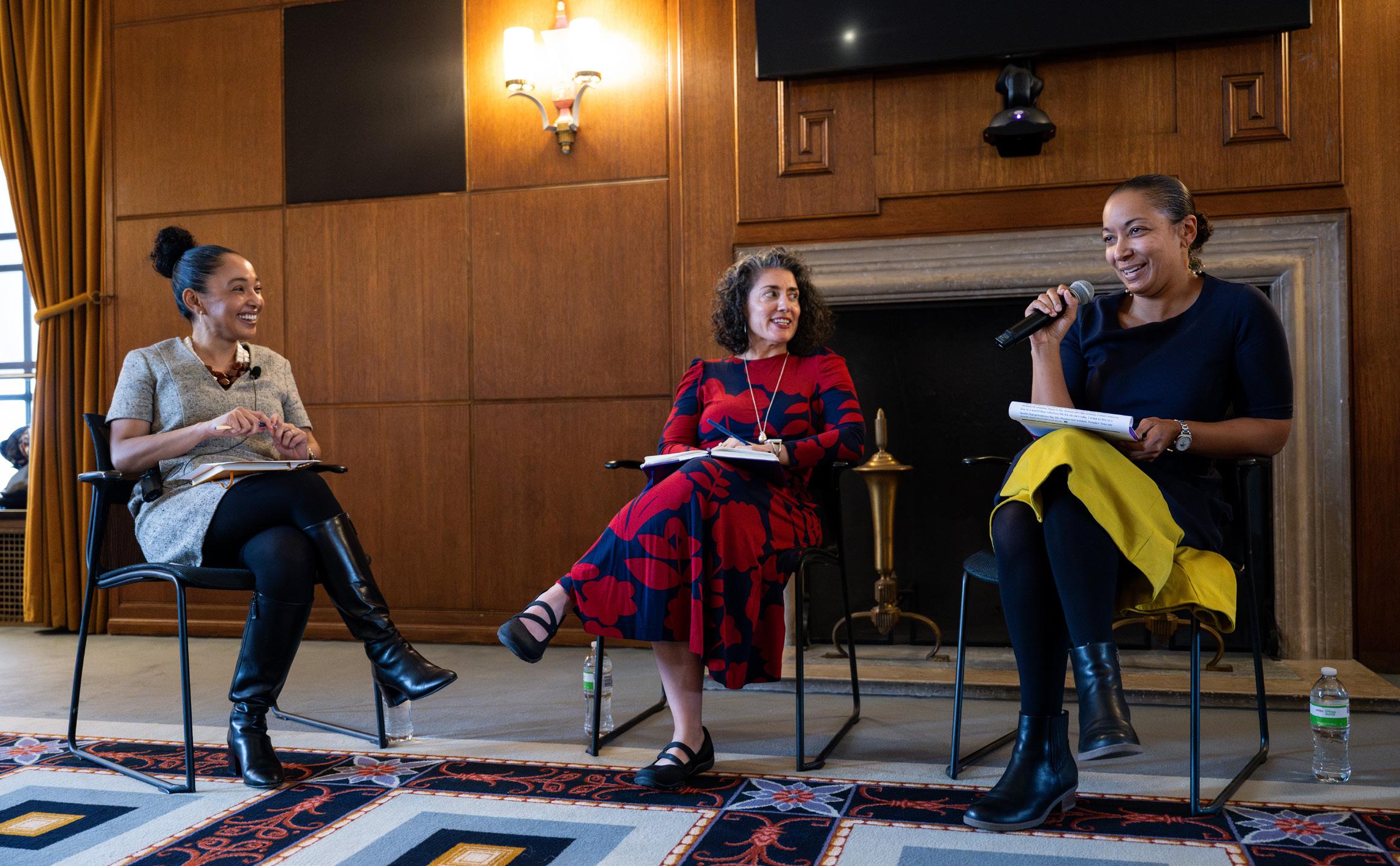
"IMPERIAL MOODS: MID-CENTURY MUSIC AND THE COLD WAR"
Manan Desai, American Culture
"WHEN YOU WERE MINE: THE QUEERNESS OF PRINCE"
Scott Poulson-Bryant, Afroamerican and African Studies
"AGROFUTURISM AND THE LEGACY OF SOUL FOOD"
Jessica Walker, Afroamerican & Afreican Studies and American Culture
"NATION-STATES AS RACIAL CAPITALIST OPERABILITY AND THE DOINGS THAT EVADE AND DISABLE IT"
Jodi Melamed, Norman Freehling Visiting Professor, Marguette University
“The
weekly seminars were like a craft writing seminar. A room full of scholars shared everything from technical writing advice to modeling what collaborative "thinking together" looks and feels like."
2023-2024 Graduate Fellow
Presenting distinguished visitors to enhance the humanities at Michigan.
"BLACK FEMINIST FUTURES"
with Jennifer Nash, Professor of Gender, Sexuality, and Feminist Studies at Duke University; Samantha Pinto, Professor of English at University of Texas at Austin; and Aida Levy-Hussen, Associate Professor of English Language and Literature, U-M
"THE HUMANITIES AND ARTS IN OUR LIVES AS DOCTORS AND PHYSICIANS IN TRAINING"
a U-M faculty and student panel with Lisa Harris, MD; Daniel Muller, MD; Preeti Malani, MD; Scott Stonington, MD; and medical students Zuzanna Lutrzykowska, Curtis Kuo, and Andrew Zhang
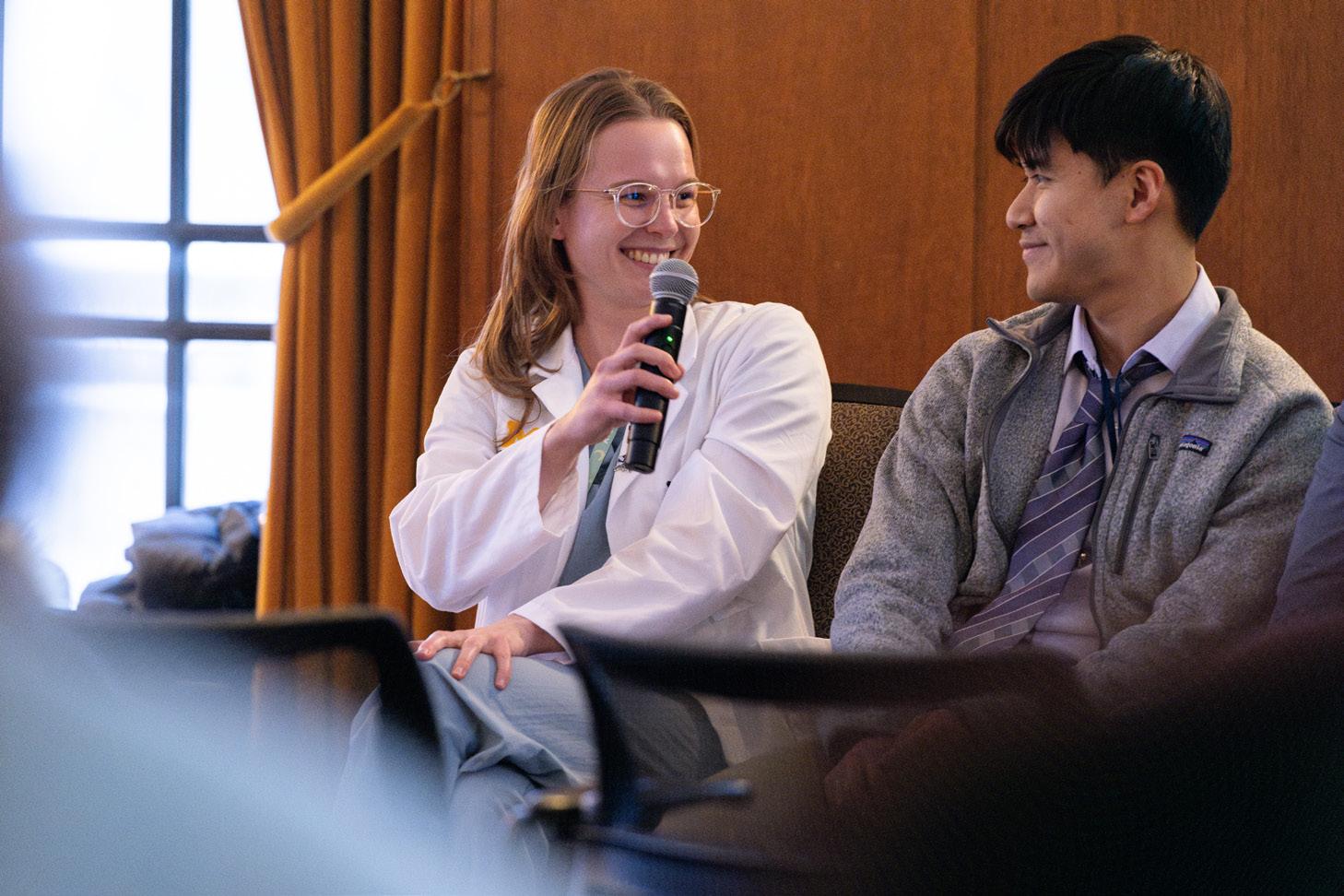
Asma Baban, administrative coordinator
Shaunda Bunton, assistant director, public programming and engagement
Ed Diven, gallery coordinator
Stephanie Harrell, assistant director, undergraduate engagement & marketing
Amanda Krugliak, arts curator & assistant director, creative programming
Peggy McCracken, director
Annika Smits, graphic designer
Sheri Sytsema-Geiger, administrative manager
Clare Croft, Dance, American Culture
Aileen Das, Classical studies, Middle East studies, Judaic studies, history
Gregory Dowd, ex officio; associate dean, humanities; American culture
Peggy McCracken, ex officio; director, Institute for the Humanities; French, Women's and Gender Studies, Comparative Literature
Youngju Ryu, Asian languages and cultures
Catherine Sanok, English Language & Literature, Women's and Gender Studies
Jason Young, history
THE REGENTS OF THE UNIVERSITY OF MICHIGAN
Jordan B. Acker, Southfield
Michael J. Behm, Grand Blanc
Mark J. Bernstein, Ann Arbor
Paul W. Brown, Ann Arbor
Sarah Hubbard, Lansing
Denise Ilitch, Bingham Farms
Santa Ono, ex officio
Ron Weiser, Ann Arbor
Katherine E. White, Ann Arbor
0 empty seats at "Major Feelings: Cathy Park Hong in Conversation with Peter Ho Davies"
The University of Michigan, as an equal opportunity/ affirmative action employer, complies with all applicable federal and state laws regarding nondiscrimination and affirmative action. The University of Michigan is committed to a policy of equal opportunity for all persons and does not discriminate on the basis of race, color, national origin, age, marital status, sex, sexual orientation, gender identity, gender expression, disability, religion, height, weight, or veteran status in employment, educational programs and activities, and admissions. Inquiries or complaints may be addressed to the Senior Director for Institutional Equity, and Title IX/Section 504/ADA Coordinator, Office of Institutional Equity, 2072 Administrative Services Building, Ann Arbor, Michigan 48109-1432, 734-763-0235, TTY 734-6471388. For other University of Michigan information call 734-764-1817.
202 S. Thayer Street, Suite 1111 Ann Arbor, MI 48104-1608
734.936.3518
CONNECT WITH US!
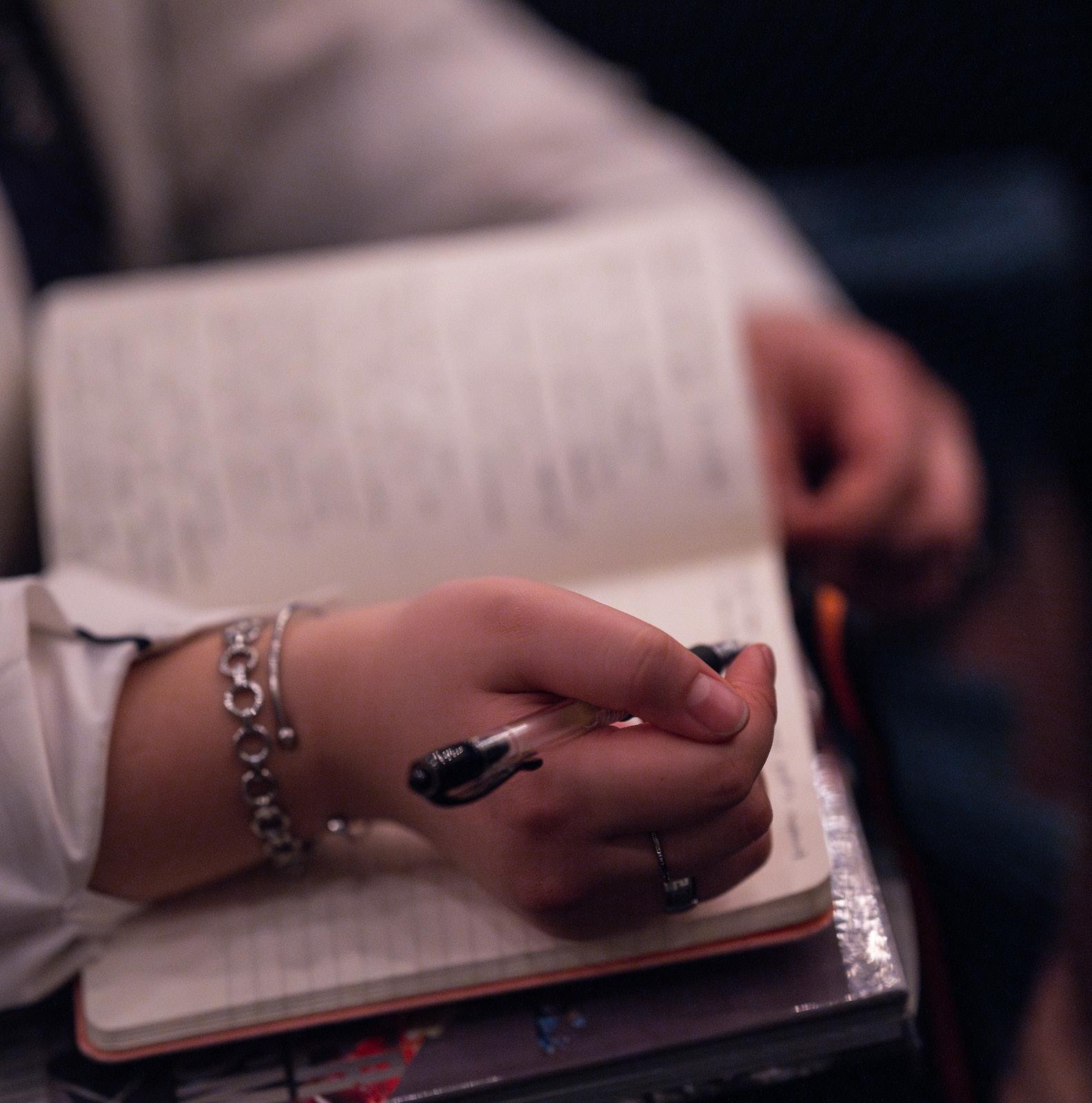
Research into the human condition—how we live in the world and how we live with each other—is vital to the cultivation of a just and equitable society. At the Institute for the Humanities, we facilitate work that examines humanities traditions broadly across space and time, deepens synergies among the humanities, the arts, and disciplines across the university, and brings the voices of the humanities to public life.
Each year we provide fellowships for Michigan faculty, graduate students, and visiting scholars who work on scholarly and artistic projects. We also offer a wide array of public and scholarly events, including public lectures, workshops, discussions and art exhibitions.
Since 1987, when Arthur Miller read from his memoir Timebends at our inauguration, the Institute has granted fellowships to over 500 Michigan faculty, Michigan graduate students, and visiting faculty and artists.
The Institute for the Humanities:
• Encourages fellows to talk and debate, informally and formally—all in an effort to reach beyond the assumptions of a given discipline
• Promotes innovative teaching in the humanities, encouraging fellows to add perspectives from other disciplines to the courses they teach
• Brings nationally known scholars, artists, and performers to Michigan to participate in programs, conferences, and fellowships
• Offers programs reaching out to university and public audiences. Brings together those who create—artists, musicians, actors, writers—with those who analyze these art forms.
The University of Michigan is located on the territory of the Anishinaabe people. In 1817, the Ojibwe, Odawa, and Bodewadami Nations made the largest single land transfer to the University of Michigan, ceded in the Treaty of Fort Meigs, so that their children could be educated. We acknowledge the history of native displacement that allowed the University of Michigan to be founded. Today we reaffirm contemporary and ancestral Anishinaabek ties to the land and their profound contributions to this institution.
